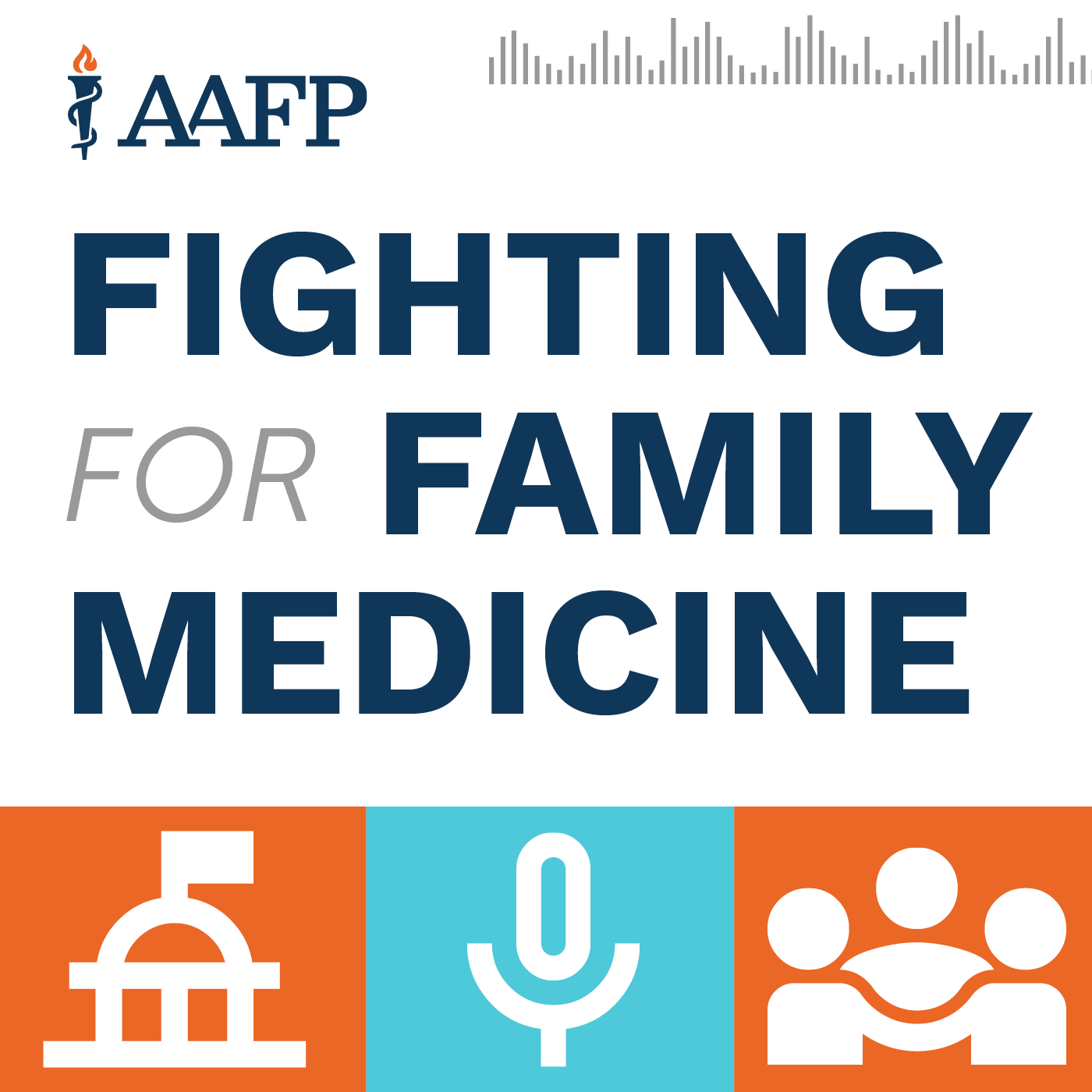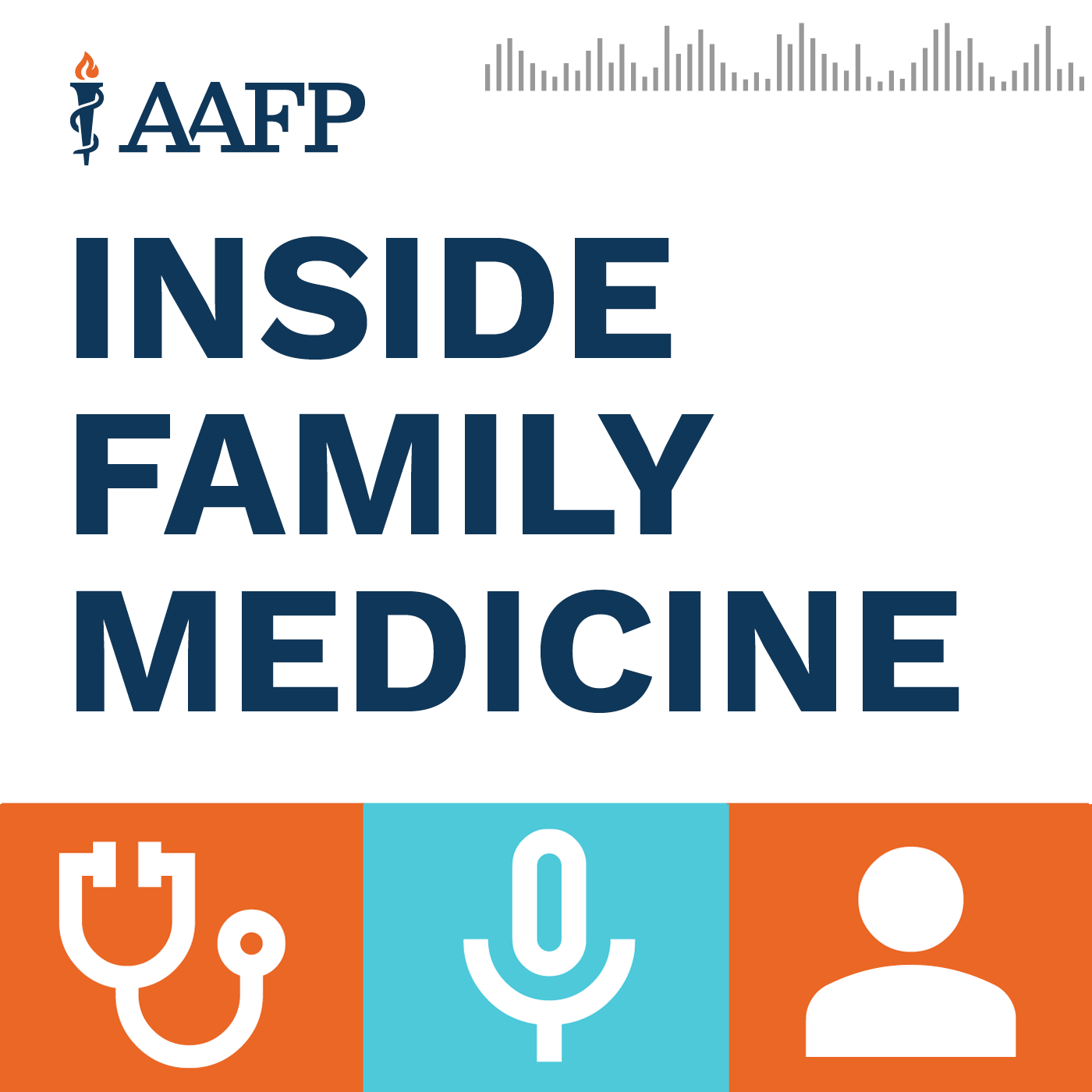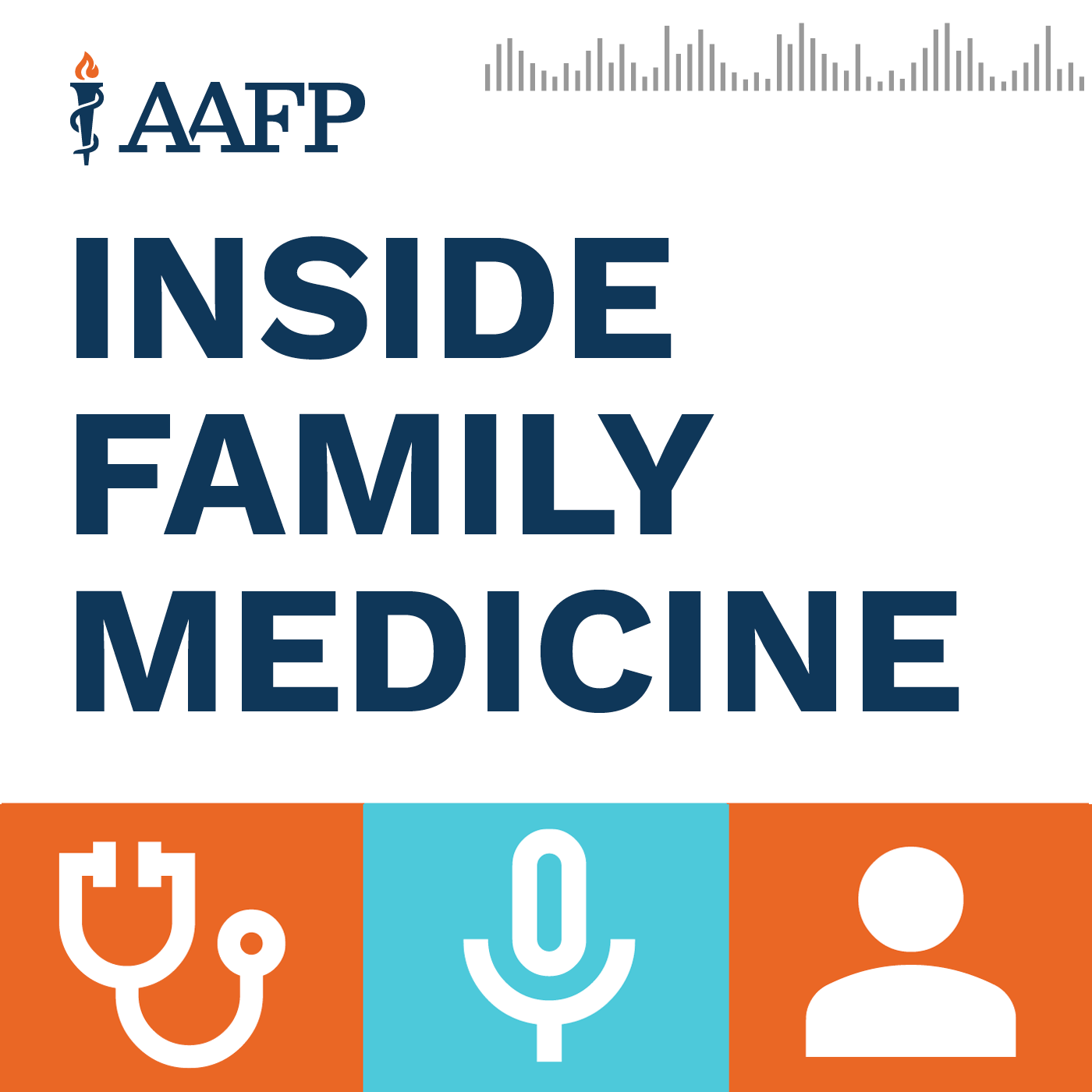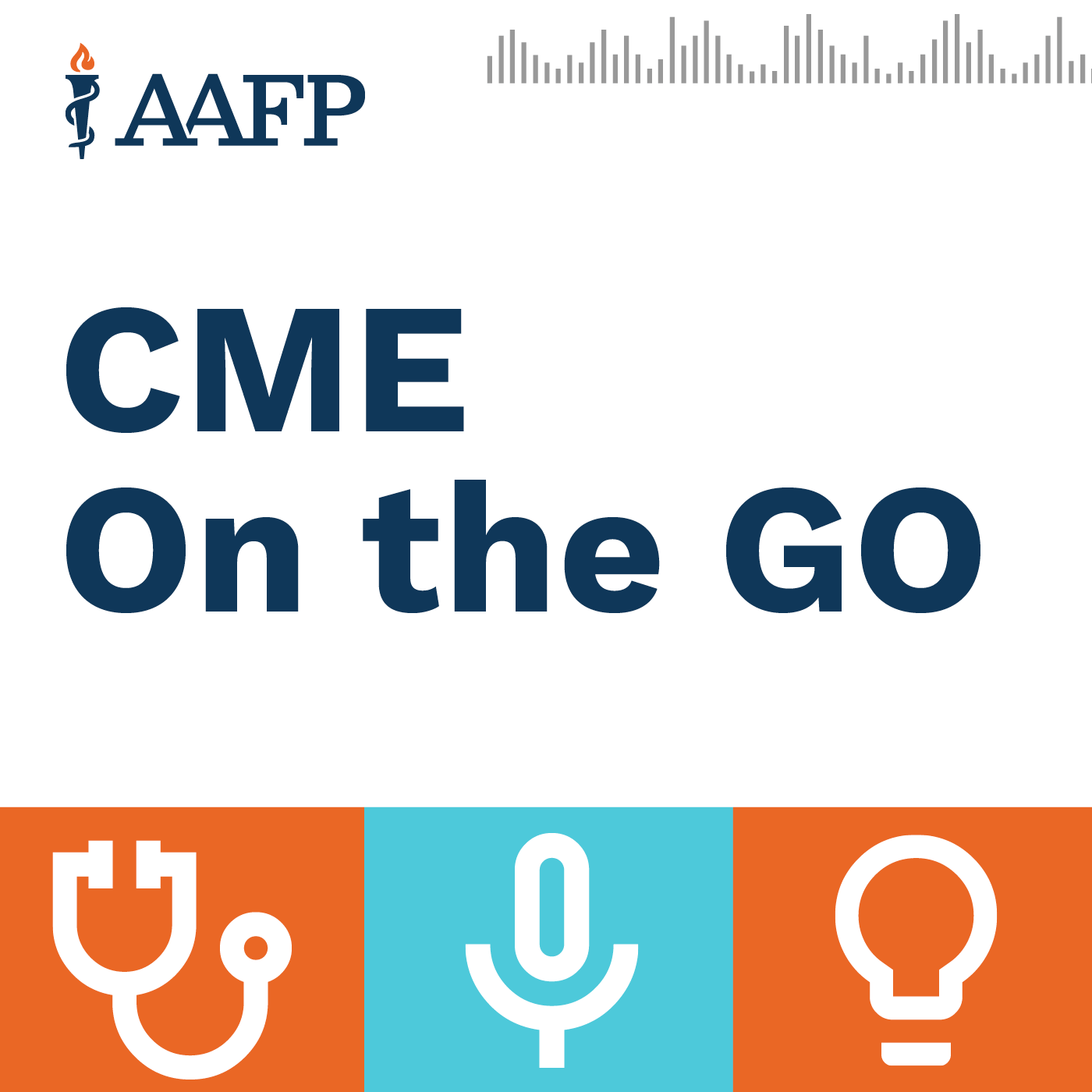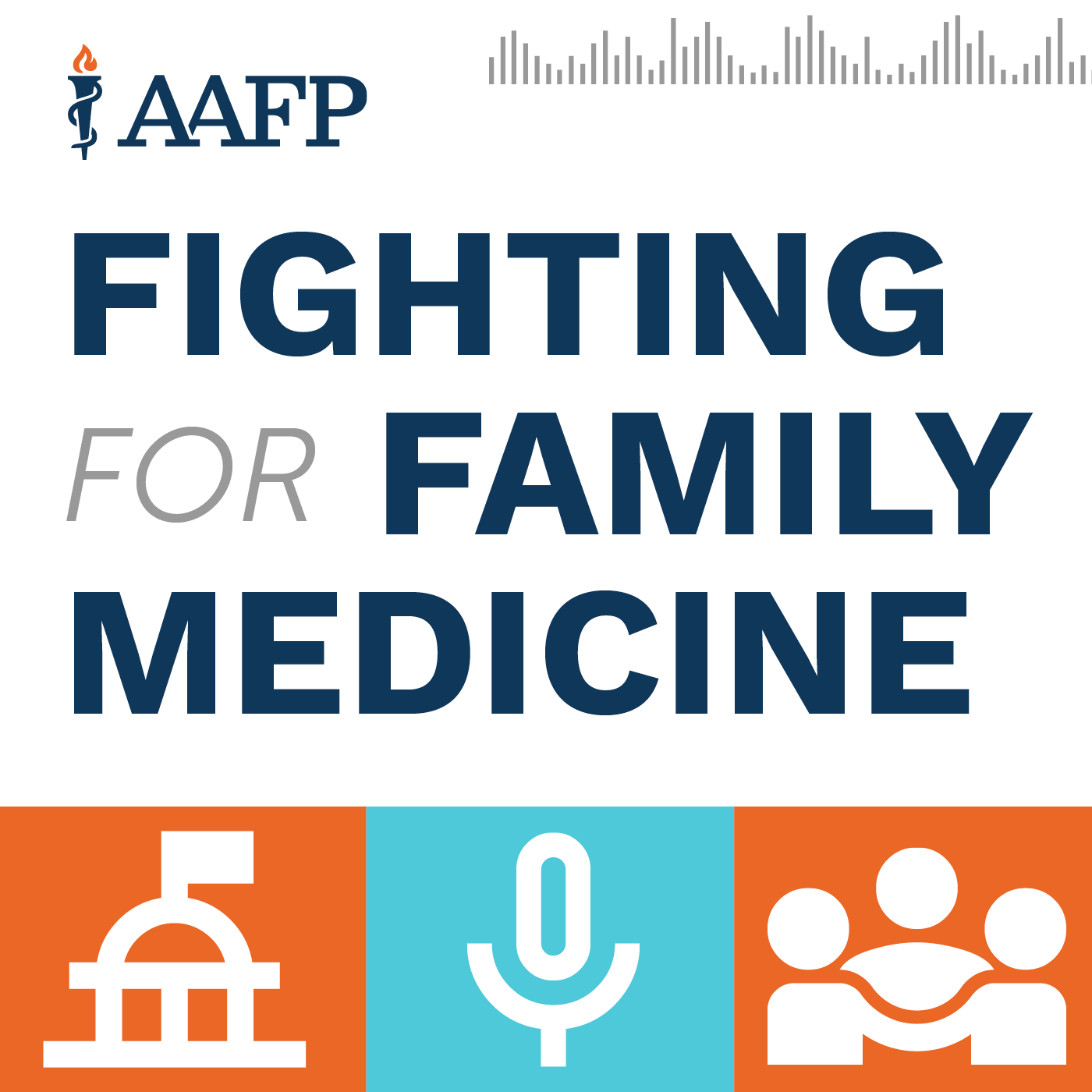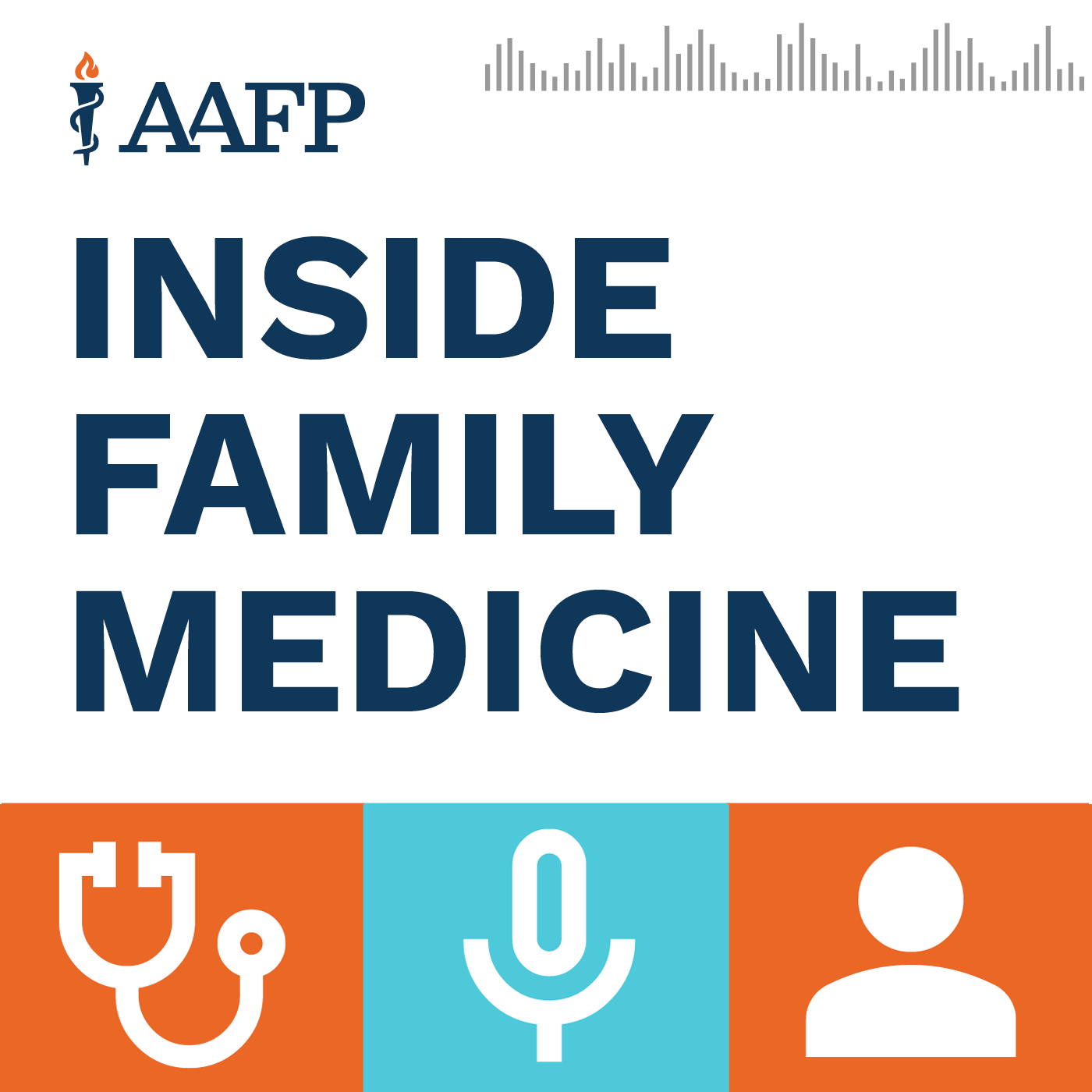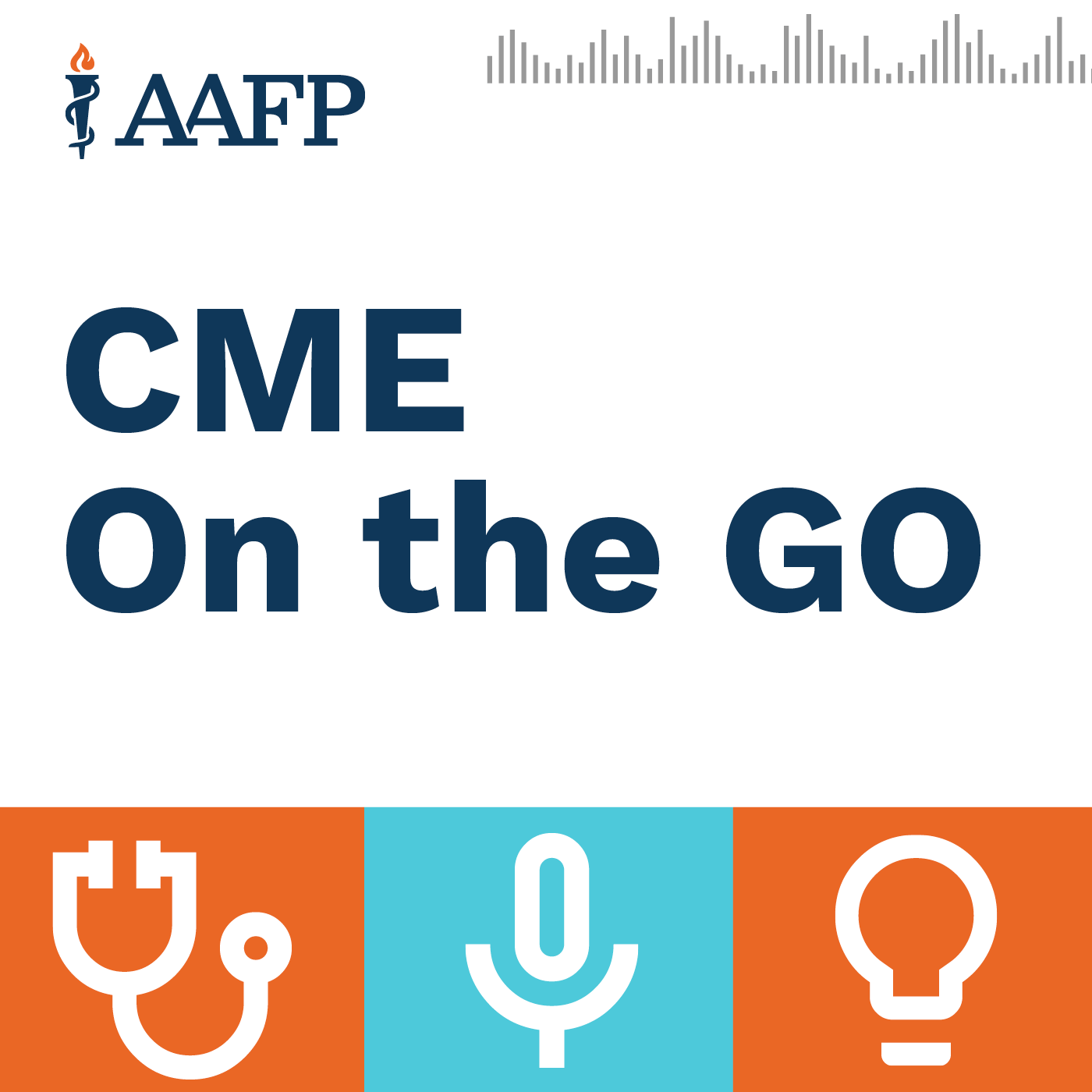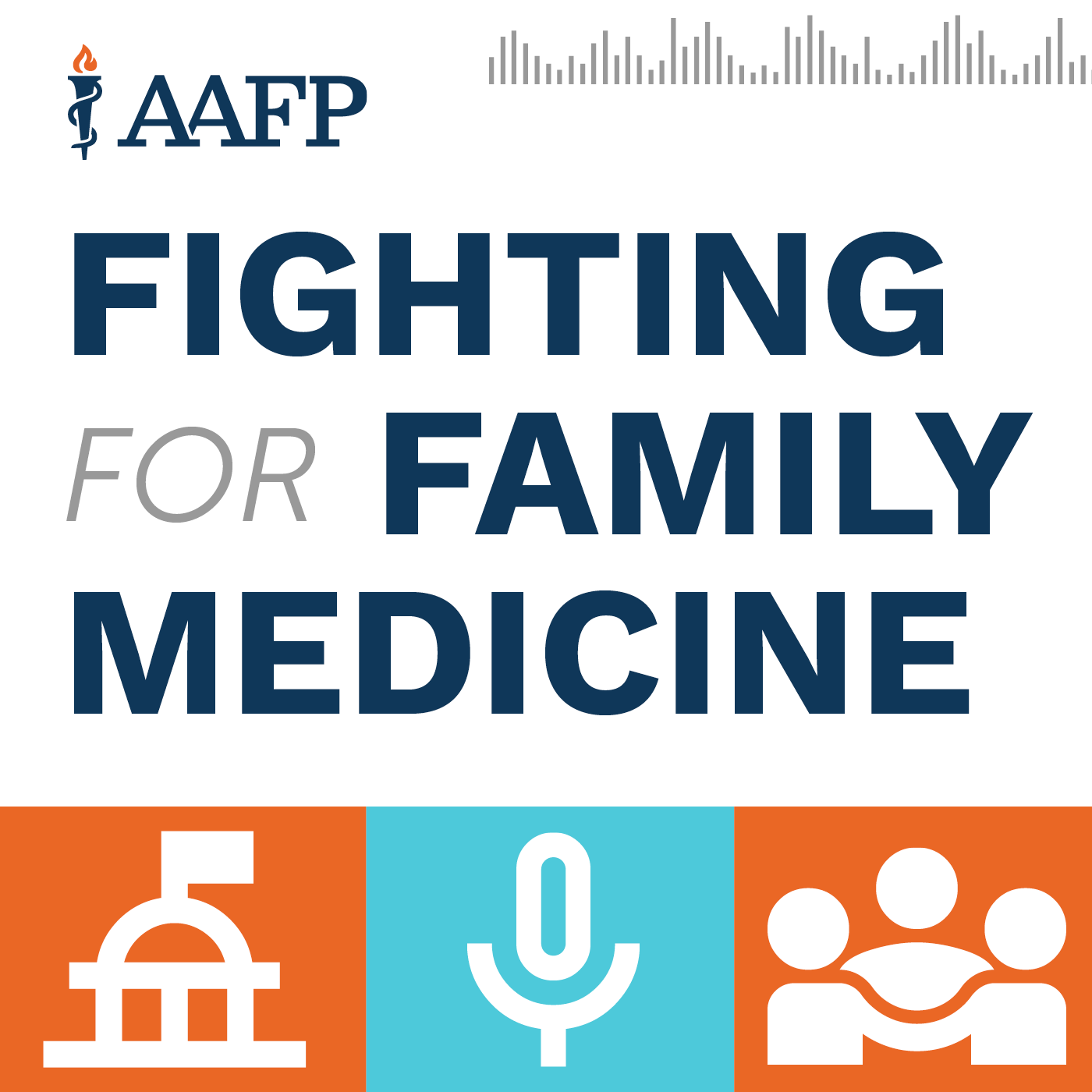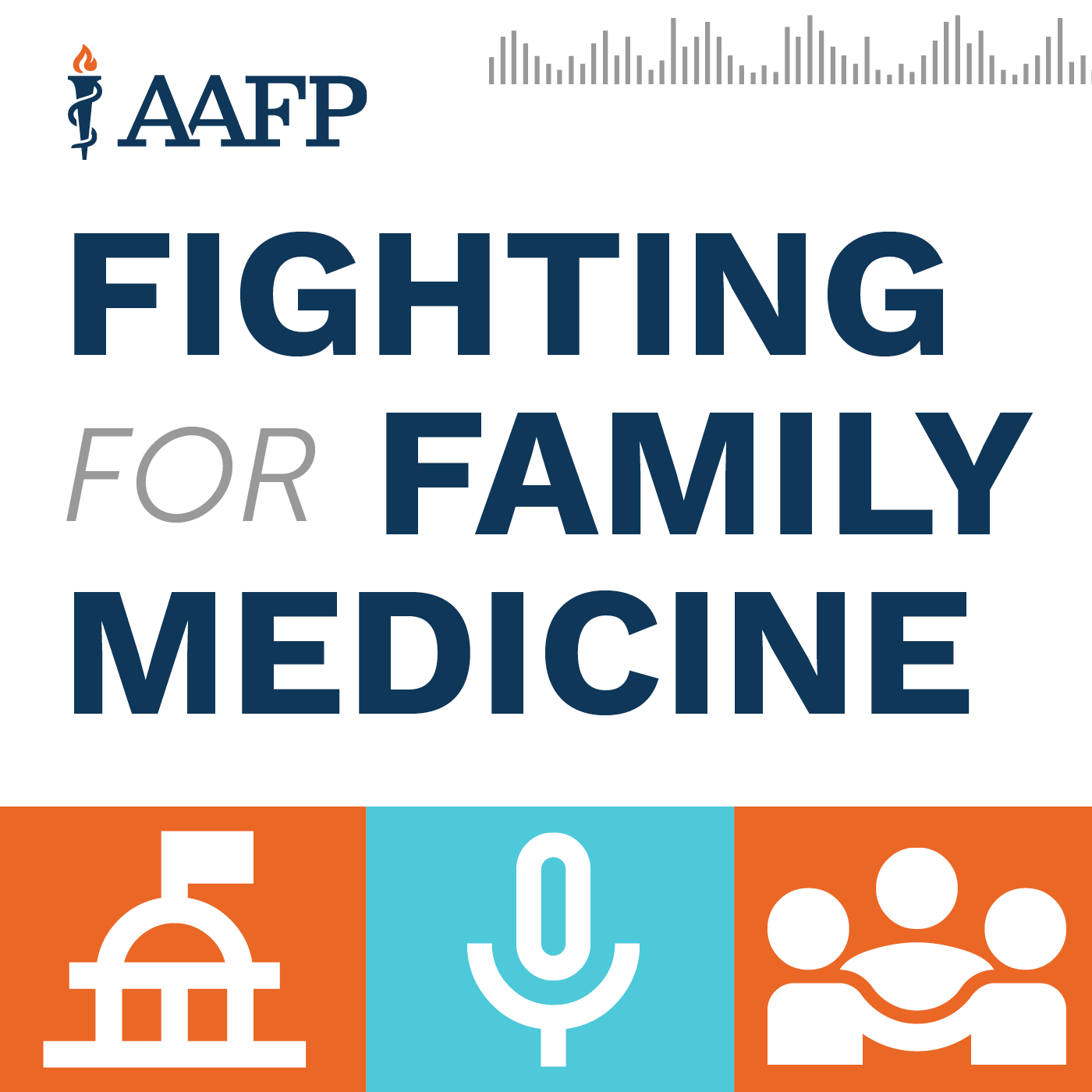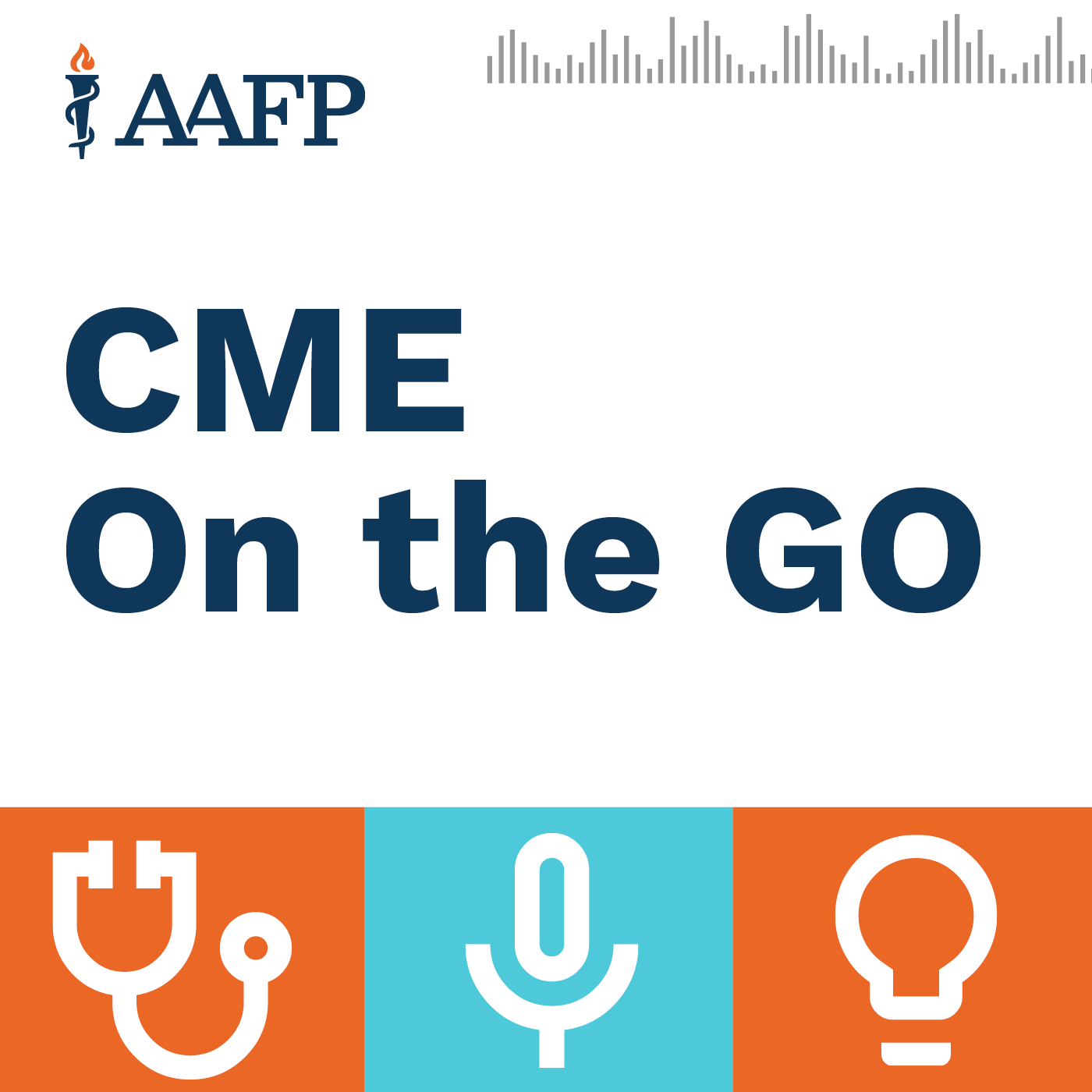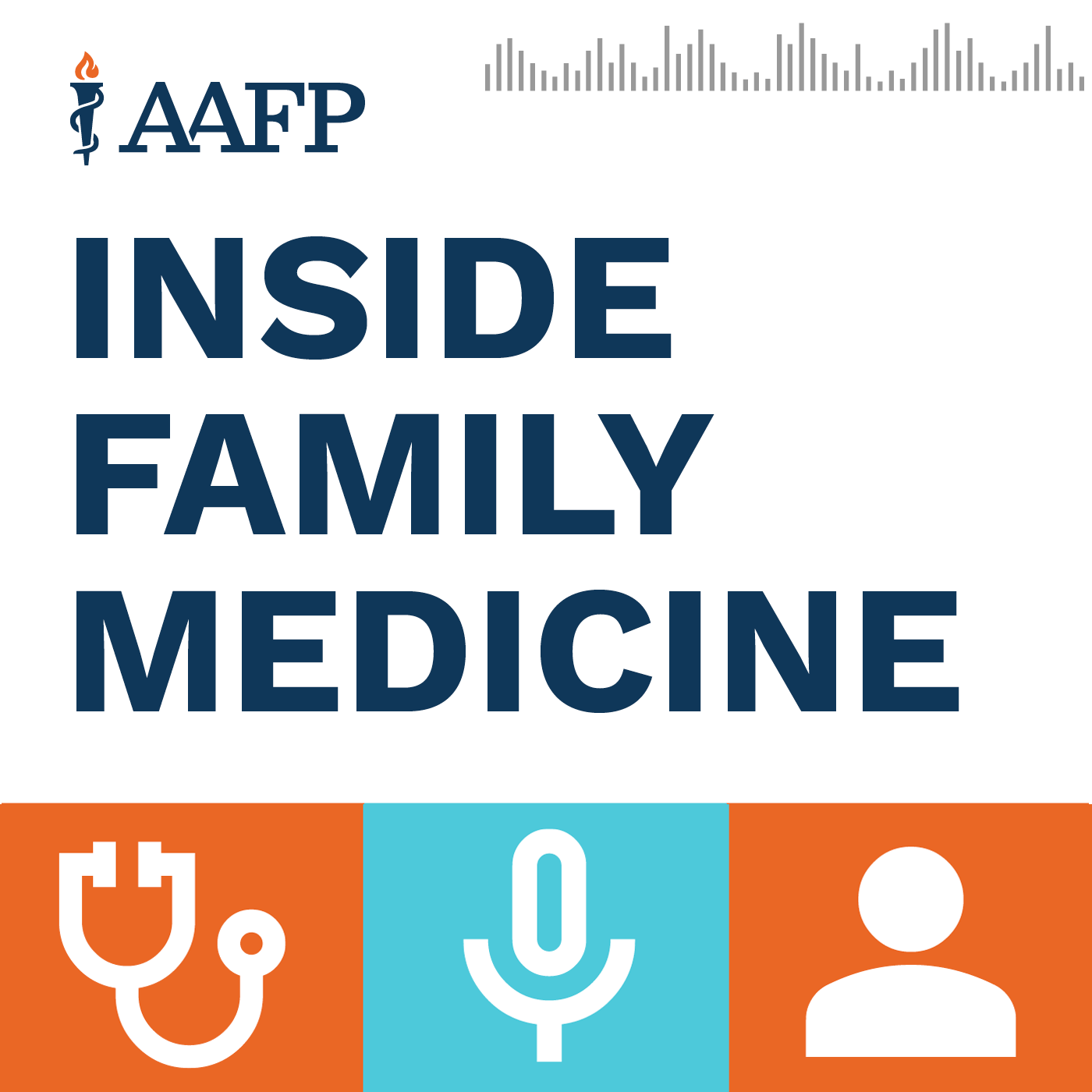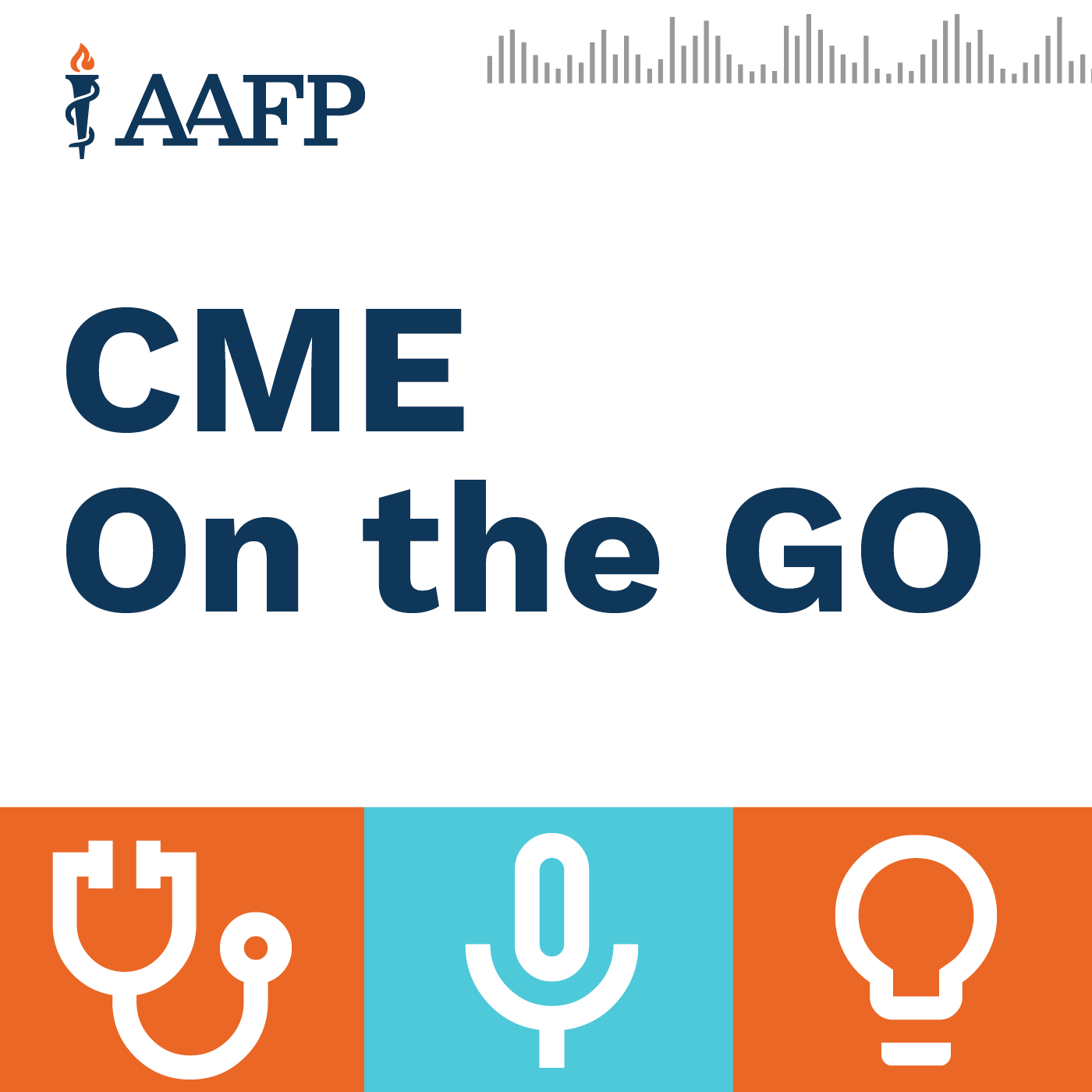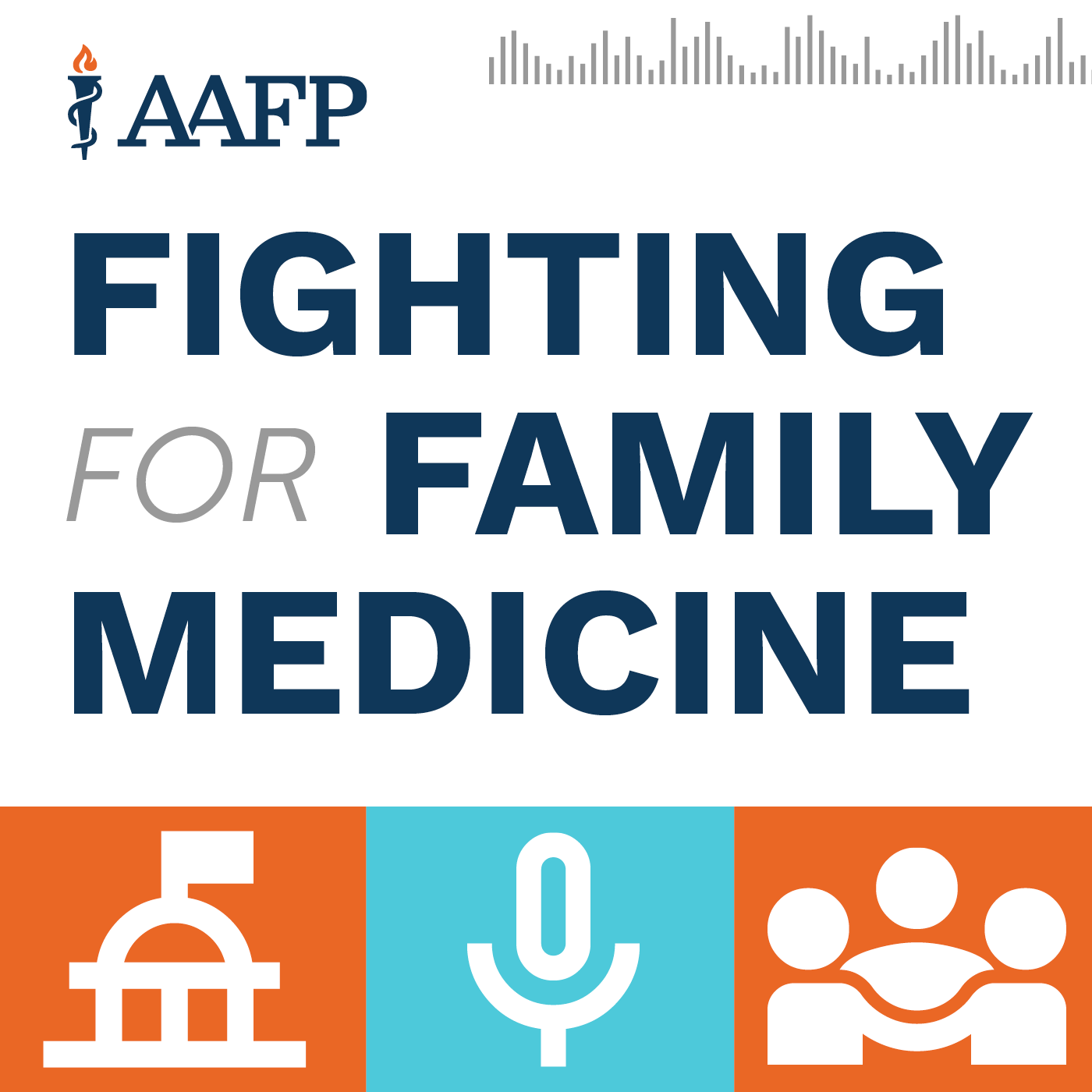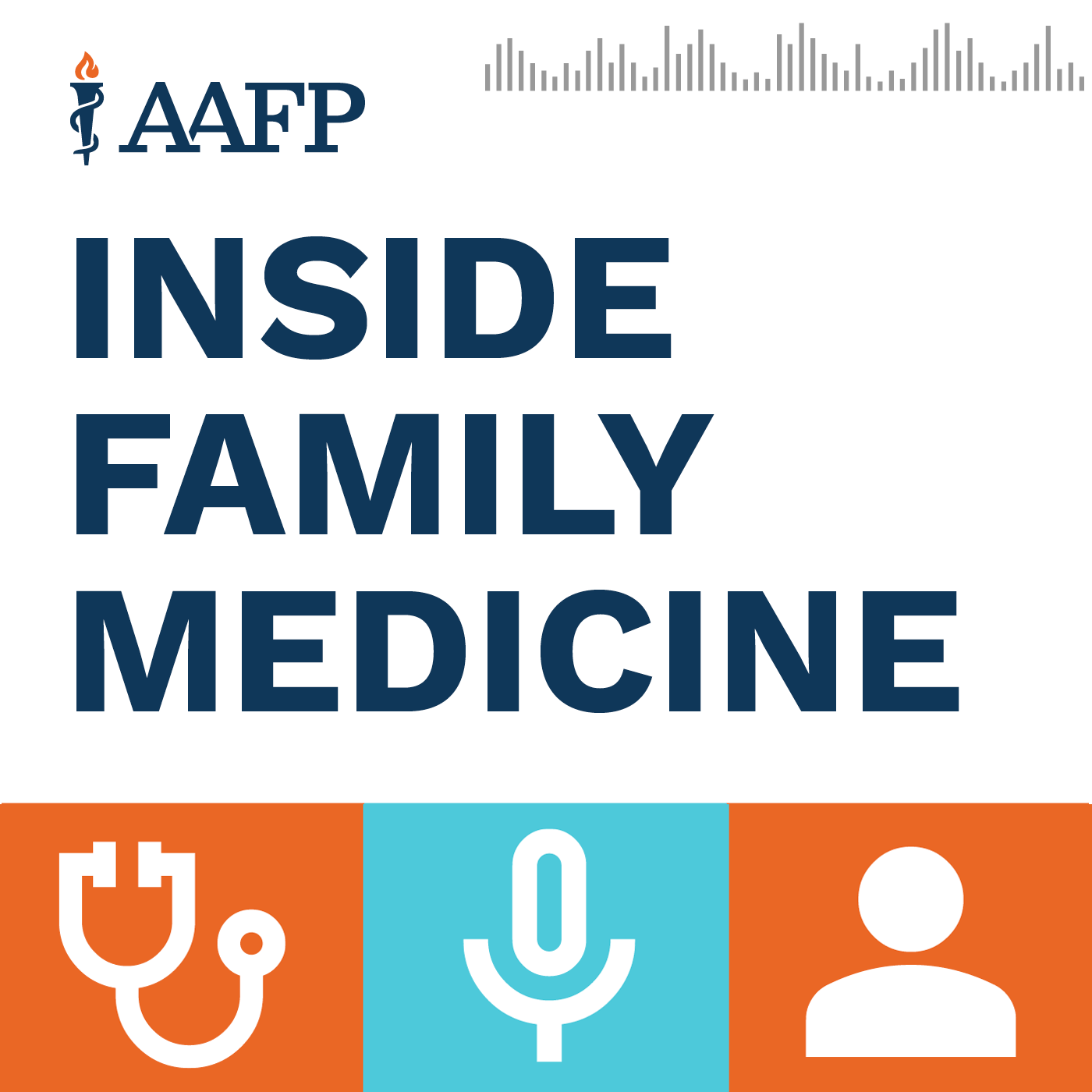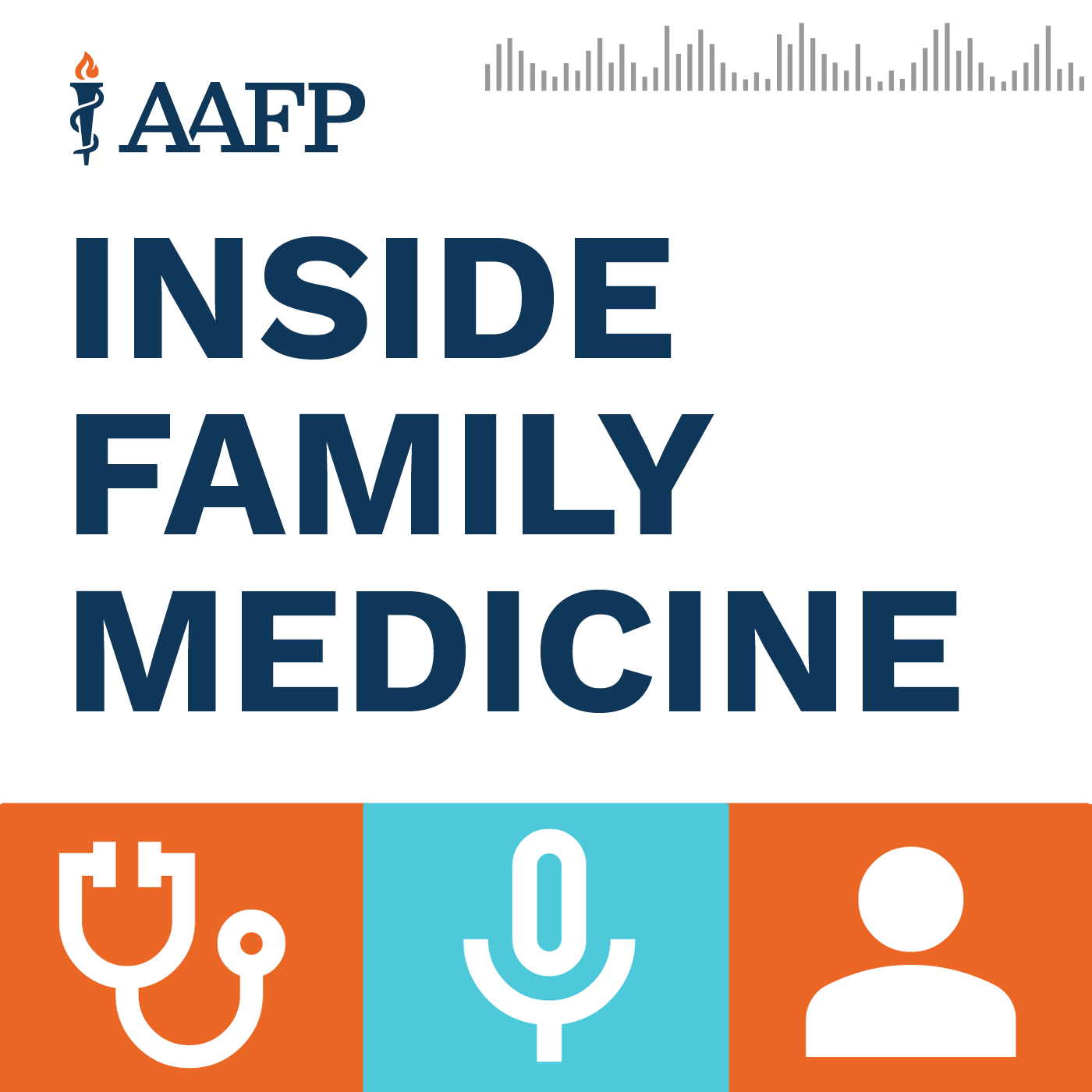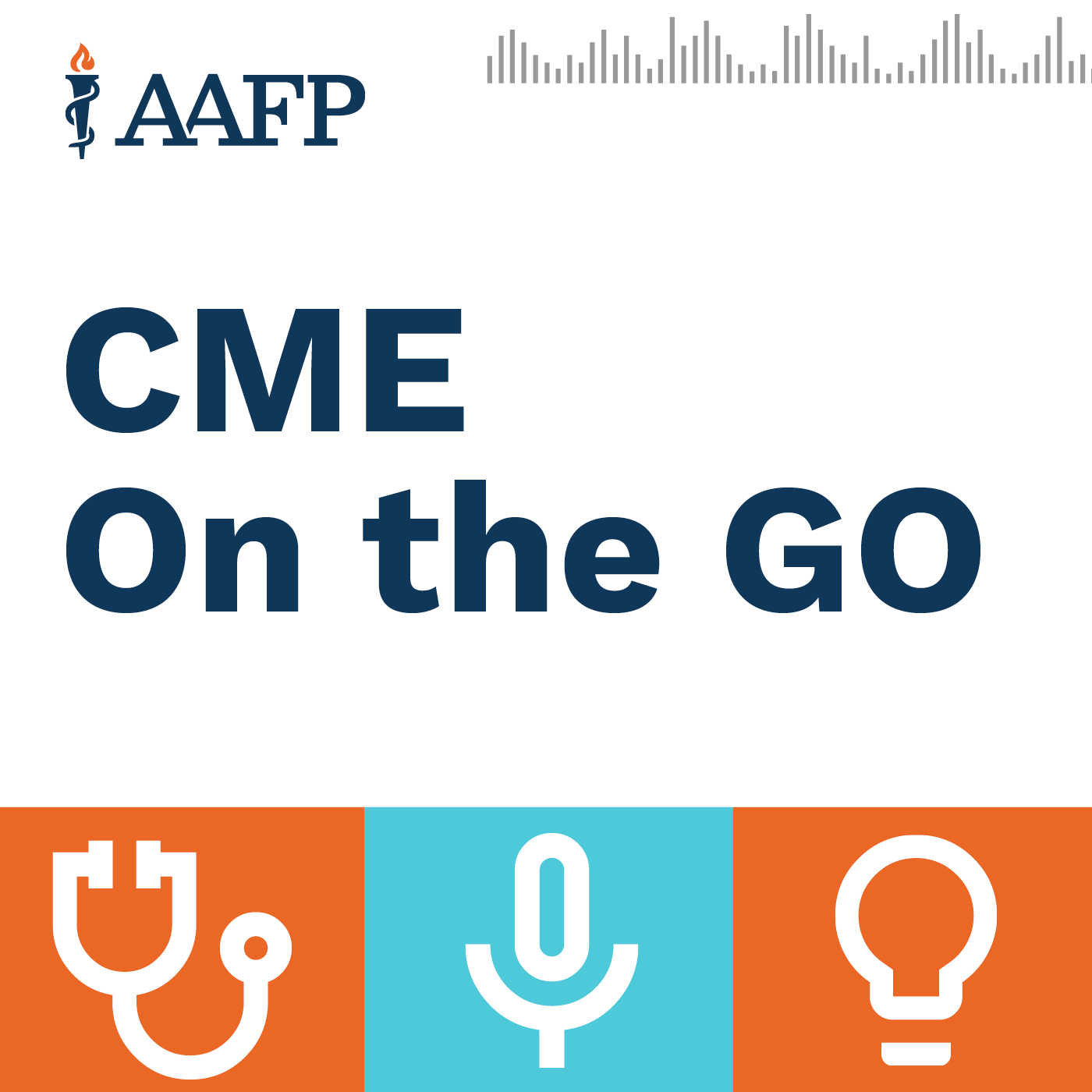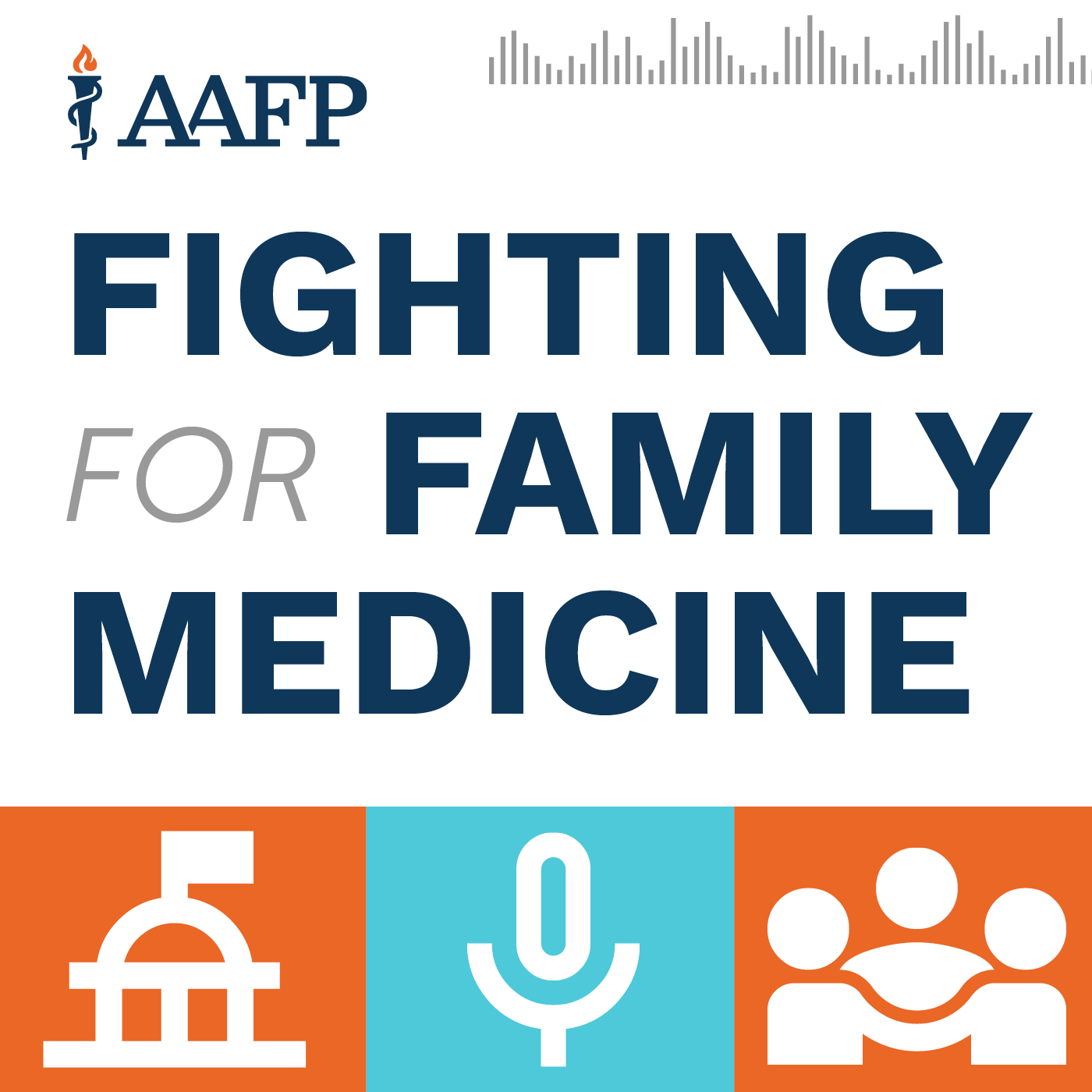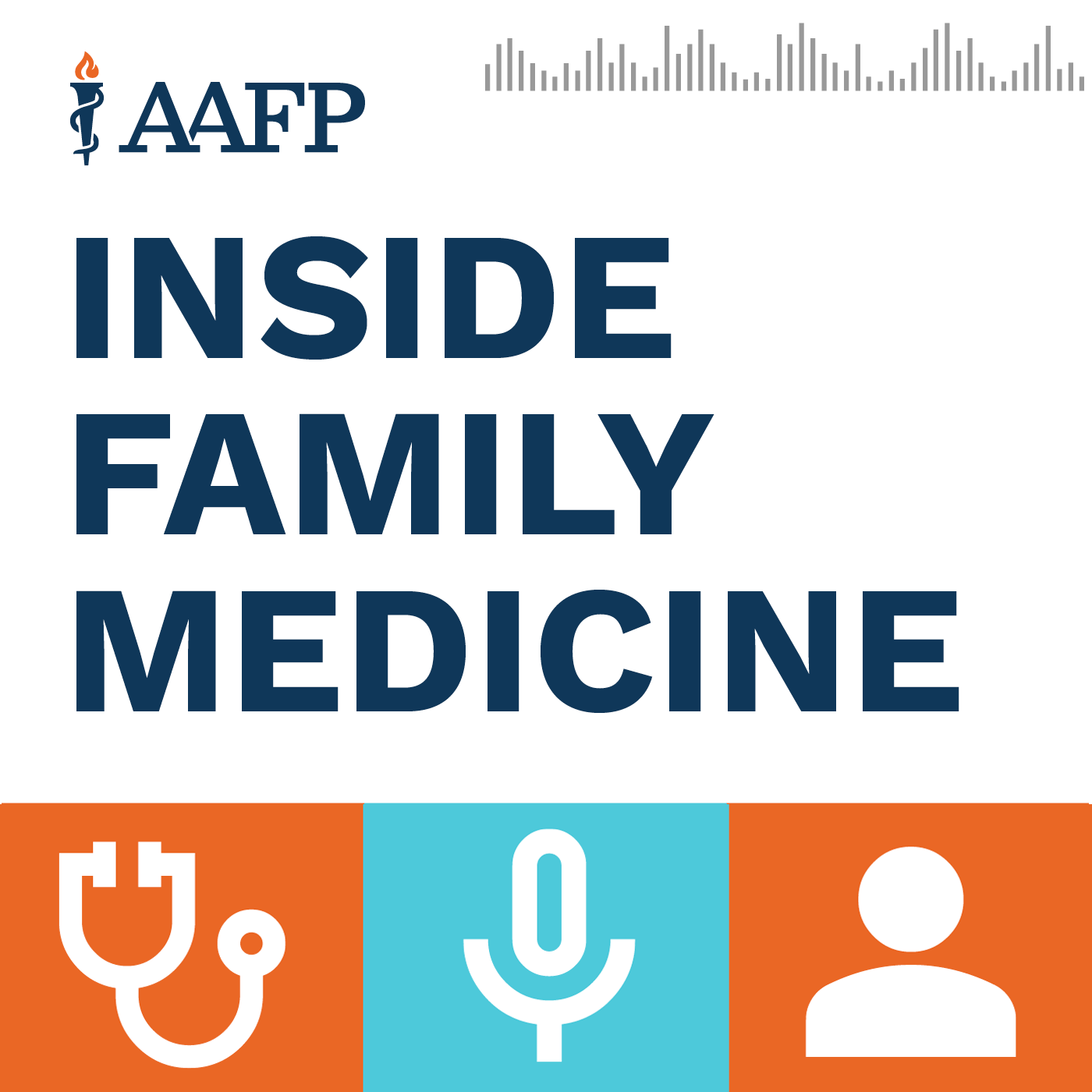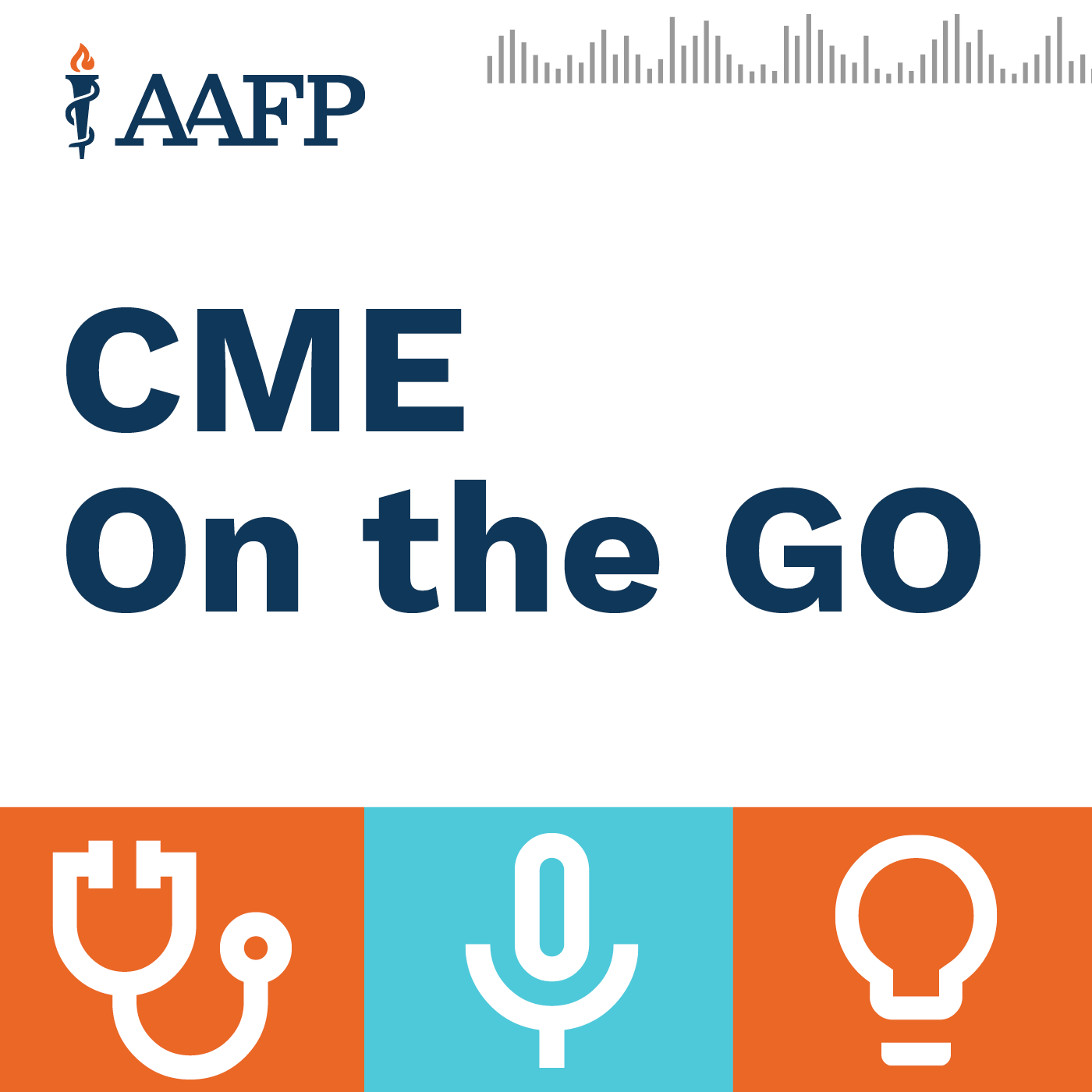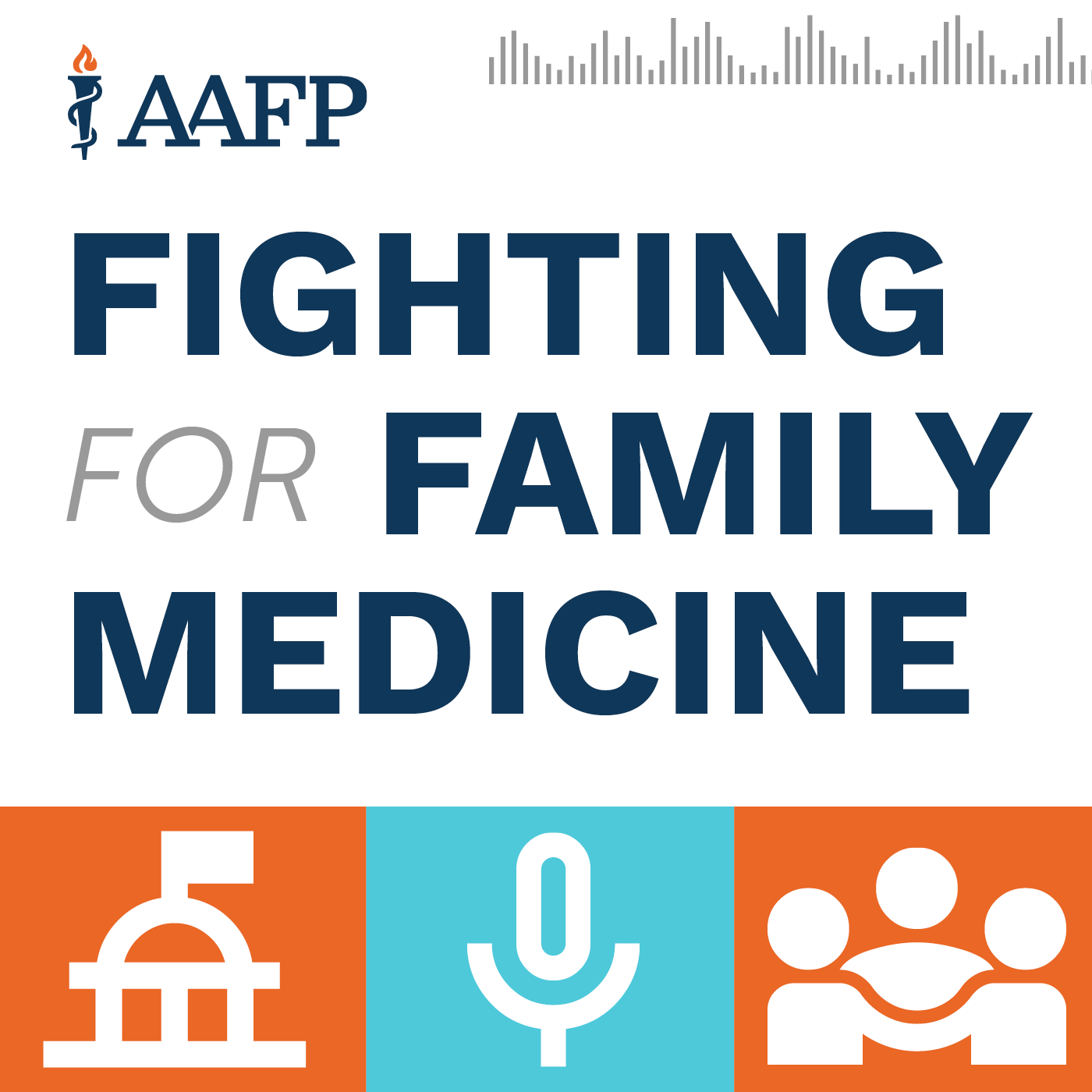Discover Inside Family Medicine
Inside Family Medicine

125 Episodes
Reverse
As the holiday season approaches, David Tully, VP of Government Relations at the AAFP, recaps the organization's advocacy efforts in November. Key topics include the Medicare physician fee schedule; student loan debt for primary care physicians; and meetings with lawmakers to push for continued telehealth flexibilities, strengthening the primary care workforce and ensuring that the Medicare physician fee schedule is implemented as published. The AAFP also addresses the issue of down coding by health plans and the urgency to extend ACA health care tax credits. Listeners are encouraged to get involved through AAFP's advocacy programs and check the show notes for detailed information. Topics By Timestamp 00:00 Introduction to the AAFP's advocacy efforts 00:37 Understanding the Medicare physician fee schedule 01:52 Advocating for student loan debt reduction 02:43 Meeting with lawmakers to improve care access 03:40 Addressing downcoding practices 04:24 Ensuring access to affordable health care 04:51 Conclusion and How to Get Involved Additional Resources November 2025 FMAR Speak Out | AAFP Downcoding letter Family Physicians Respond to Final 2026 Medicare Physician Fee Schedule | AAFP Leading Physician Groups: Department of Education's PSLF Rule Will Hurt Patients and Physicians | AAFP Disclaimer: Copyright 2025, AAFP. The views presented in this broadcast are the speaker's own and do not represent those of AAFP. The information presented is for general, educational, or entertainment purposes and should not be considered legal, health, financial, or other advice. The AAFP makes no representation as to the accuracy or completeness of the information and is not responsible for results that may arise from its use. Consult an appropriate professional concerning your specific situation and respective governing bodies for applicable laws. Reference to any specific product or entity does not constitute an endorsement or recommendation by AAFP unless specifically stated otherwise. AAFP and the AAFP logo are registered trademarks of American Academy of Family Physicians.
In this episode of Inside Family Medicine, we are joined by Rita Choula, AARP's Senior Director of Caregiving, and Dr. Ecler Jaqua, a family and geriatric medicine expert, to discuss how family physicians can support caregivers. Topics include the role and challenges faced by family caregivers, key findings from AARP's Caregiving in the US 2025 report, and important practices for family physicians to support caregivers. Both guests share personal experiences and underscore the importance of recognizing and supporting caregivers as a critical component of the health care system. Topics By Timestamp 00:00 Introduction to Inside Family Medicine 00:12 Meet the Experts: Rita Chola and Dr. Ecler Jaqua 01:37 AARP's Role in Supporting Caregivers 03:37 Key Findings from AARP's Caregiving Report 05:49 Challenges Faced by Family Caregivers 07:22 Supporting Caregivers in Family Medicine 10:12 The Growing Caregiving Population 11:51 Training and Support for Caregivers 17:32 Unique Challenges of the Sandwich Generation 22:58 Personal Stories and Impactful Support 27:25 Final Takeaways and Resources Additional Resources Caregiving in the US 2025: Key Trends, Strains, and Policy Needs Caregiving in the U.S. 2025 - AARP Research Report Geriatric Medicine Online CME | AAFP Disclaimer: Copyright 2025. AAFP. The views presented in this broadcast are the speaker's own and do not represent those of AAFP. The information presented is for general, educational, or entertainment purposes and should not be considered legal, health, financial, or other advice. AAFP makes no representation as to the accuracy or completeness of the information and is not responsible for results that may arise from its use. Consult an appropriate professional concerning your specific situation and respective governing bodies for applicable laws. Reference to any specific product or entity does not constitute an endorsement or recommendation by AAFP unless specifically stated otherwise. AAFP and the AAFP logo are registered trademarks of American Academy of Family Physicians.
In this episode of Inside Family Medicine, we hear from Dr. Brittney Anderson, a board-certified family physician and founder of Anderson Family Care in rural Alabama. Dr. Anderson discusses her journey from training to opening her private practice, the importance of providing comprehensive care in rural areas, and the challenges and rewards of owning a private practice. She emphasizes the significance of community involvement and shares valuable advice for physicians considering opening their own practices. Topics By Timestamp 00:00 Introduction 00:11 Meet Dr. Brittney Anderson 01:07 Choosing Family Medicine 01:47 Practicing in Rural Alabama 06:17 Community Involvement and Impact 09:32 Starting a Private Practice 11:48 Balancing Clinical and Business Demands 16:02 Advice for Aspiring Private Practitioners 21:15 Conclusion and Resources Additional resources Rural Health | AAFP | AAFP Rural Health | AAFP (member interest group) Rural Health Information Hub Starting, Closing, or Selling a Practice | AAFP Business of Medicine for Physicians | AAFP Business Fundamentals for New Physicians CME | AAFP AAFP starting a practice tool: https://www.aafp.org/content/dam/AAFP/documents/practice_management/restricted/start-a-practice.xlsx Independent Solo/Small Group Practice | AAFP (member interest group) Disclaimer: Copyright 2025. AAFP. The views presented in this broadcast are the speaker's own and do not represent those of AAFP. The information presented is for general, educational, or entertainment purposes and should not be considered legal, health, financial, or other advice. AAFP makes no representation as to the accuracy or completeness of the information and is not responsible for results that may arise from its use. Consult an appropriate professional concerning your specific situation and respective governing bodies for applicable laws. Reference to any specific product or entity does not constitute an endorsement or recommendation by AAFP unless specifically stated otherwise. AAFP and the AAFP logo are registered trademarks of American Academy of Family Physicians.
In this episode of CME on the Go, our hosts delve into the nuances of medical teaching and education. They share personal experiences, teaching strategies, and the significance of engaging learners from different generations. The episode highlights the importance of questioning, respect, and collaborative learning in developing skilled family physicians. Special guest, Chief Resident Elaine Wong, provides insights into what makes teaching effective from a learner's perspective, emphasizing the value of interactive and respectful learning environments. After listening to the podcast episode, claim 0.5 AAFP credit by following the provided link. https://www.aafp.org/assessment/take/19541/e Learning Objectives Implement practical teaching strategies that actively engage learners in patient care, improving both educational outcomes and clinical efficiency. Demonstrate how patient-centered teaching at the bedside can reinforce trust, model collaborative care, and strengthen the overall quality of family medicine practice. References and Resources https://www.aafp.org/pubs/afp/issues/2020/0801/p140.html https://www.stfm.org/facultyskillscourse https://www.teachingphysician.org/\ Disclosure: It is the policy of the AAFP that all individuals in a position to control content disclose any relationships with commercial interests upon nomination/invitation of participation. Disclosure documents are reviewed for potential conflicts of interest and, if identified, conflicts are resolved prior to confirmation of participation. Only those participants who had no conflict of interest or who agreed to an identified resolution process prior to their participation were involved in this CME activity. All individuals in a position to control content for this session have indicated they have no relevant financial relationships to disclose. Disclaimer: Copyright 2025. AAFP. The views presented in this broadcast are the speaker's own and do not represent those of AAFP. The information presented is for general, educational, or entertainment purposes and should not be considered legal, health, financial, or other advice. AAFP makes no representation as to the accuracy or completeness of the information and is not responsible for results that may arise from its use. Consult an appropriate professional concerning your specific situation and respective governing bodies for applicable laws. Reference to any specific product or entity does not constitute an endorsement or recommendation by AAFP unless specifically stated otherwise. AAFP and the AAFP logo are registered trademarks of American Academy of Family Physicians.
In this episode of Fighting for Family Medicine, host David Tully, vice president of Government Relations at the AAFP, speaks with Kate Gilliard, the Academy's senior manager for federal policy and regulatory affairs, about the newly finalized 2026 Medicare physician fee schedule (MPFS). The conversation covers the MPFS' efficiency adjustment policy, adjustments for practice expense and the creation of new add-on codes for advanced primary care management (APCM) services. Topics By Timestamp 00:00 Introduction 00:24 Breaking down the 2026 Medicare physician fee schedule 01:14 Understanding the conversion factors 01:59 The catch in the fee schedule 03:07 Efficiency adjustment explained 05:01 Practice expense information 06:44 New add-on codes and cost-sharing 08:43 Conclusion Additional Resources AAFP News: Final 2025 MPFS brings primary care payment boost and other wins AAFP Voices blog post: Some good news for primary care: the 2026 Medicare physician fee schedule AAFP executive summary of the 2026 Medicare physician fee schedule final rule AAFP News story on the Academy's letter to CMS on the proposed MPFS AAFP advocacy focus: Medicare physician payment AAFP H.R. 1 member resource FPM: What is the RUC? AAFP Medicare physician payment Speak Out campaign AAFP Advocacy Ambassadors Disclaimer: Copyright 2025, AAFP. The views presented in this broadcast are the speaker's own and do not represent those of AAFP. The information presented is for general, educational, or entertainment purposes and should not be considered legal, health, financial, or other advice. The AAFP makes no representation as to the accuracy or completeness of the information and is not responsible for results that may arise from its use. Consult an appropriate professional concerning your specific situation and respective governing bodies for applicable laws. Reference to any specific product or entity does not constitute an endorsement or recommendation by AAFP unless specifically stated otherwise. AAFP and the AAFP logo are registered trademarks of American Academy of Family Physicians.
In this special edition of 'Inside Family Medicine', sponsored by Sanofi, Dr. Jana Shaw and Dr. Peter Ziemkowski discuss potential changes to the meningococcal vaccination schedule. Key topics include the current two-dose vaccination schedule, proposed alternative schedules, recent research findings, and the potential implications of schedule changes on public health, health equity, and disease prevention. The episode emphasizes the importance of maintaining the current vaccination schedule for effective disease prevention and highlights the significance of timely vaccinations in protecting adolescents and young adults. This episode was sponsored by Sanofi. The research discussed was developed through Sanofi funding. Topics by Timestamp 00:00 Introduction to Inside Family Medicine 00:46 Meet the Experts: Dr. Jana Shaw and Dr. Peter Ziemkowski 02:13 Current Meningococcal Vaccination Schedule 04:23 Proposed Changes to the Vaccination Schedule 05:59 Research Findings on Vaccination Schedule Changes 09:19 Impact on Health Equity and Access 12:40 Advice for Family Physicians and Policymakers 16:24 Conclusion and Additional Resources Additional Resources Research studies and related articles Assessing the Impact of Revising MenACWY Vaccination Schedule for Adolescents in the United States: A Modelling Study by Affan Shoukat, Chad Wells, Thomas Shin, Lilia Potter-Schwartz, Alison P. Galvani, Seyed M. Moghadas :: SSRN Quadrivalent Conjugate Vaccine and Invasive Meningococcal Disease in US Adolescents and Young Adults | Public Health | JAMA Network Open | JAMA Network Article by podcast guest Dr Jana Shaw - Risks of removing the age 11–12-year meningococcal vaccine dose from the US immunization schedule - ScienceDirect Clinician Resources: Meningitis information on aafp.org Patient Resources: https://familydoctor.org/condition/meningitis/ Related Activities: Leading Edge LinkedIn Live, October 5, 2025 This episode was sponsored by Sanofi. The research discussed was developed through Sanofi funding. Disclaimer: Copyright 2025. AAFP. The views presented in this broadcast are the speaker's own and do not represent those of AAFP. The information presented is for general, educational, or entertainment purposes and should not be considered legal, health, financial, or other advice. AAFP makes no representation as to the accuracy or completeness of the information and is not responsible for results that may arise from its use. Consult an appropriate professional concerning your specific situation and respective governing bodies for applicable laws. Reference to any specific product or entity does not constitute an endorsement or recommendation by AAFP unless specifically stated otherwise. AAFP and the AAFP logo are registered trademarks of American Academy of Family Physicians.
In this episode of CME on the go, recorded live at FMX in Anaheim, our hosts discuss the complexities of ADHD treatment. They cover initial thoughts on stimulant and non-stimulant medications, dosing guidelines, and the importance of addressing comorbid conditions. Listeners' feedback from a previous ADHD episode is highlighted, emphasizing the need for practical prescribing insights. The hosts also discuss the relevance of shared decision-making and strategies for managing ADHD amid potential substance abuse risks. After listening to the podcast episode, claim 0.5 AAFP credit by following the provided link. https://www.aafp.org/assessment/take/19540/e Learning Objectives Design efficient workflows for managing controlled substances in ADHD treatment, balancing regulatory requirements with patient care. Analyze the pharmacology, clinical applications, and abuse potential of stimulant medications, including considerations for off-label use and misuse in non-ADHD populations. Integrate ADHD medications into treatment plans for patients with comorbid psychiatric conditions, such as depression, to enhance overall therapeutic outcomes. References and Resources https://chadd.org/for-adults/medication-management/ Chang Z, Lichtenstein P, Halldner L, et al. Stimulant ADHD medication and risk for substance abuse. J Child Psychol Psychiatry. 2014;55(8):878-885. doi:10.1111/jcpp.12164 https://chadd.org/for-parents/substance-abuse-and-adhd/ Volkow ND, Swanson JM. Does childhood treatment of ADHD with stimulant medication affect substance abuse in adulthood?. Am J Psychiatry. 2008;165(5):553-555. doi:10.1176/appi.ajp.2008.08020237 Journal of Child and Adolescent PsychopharmacologyVol. 32, No. 4 Published Online: 17 May 2022 The Impact of Pharmacotherapy of Childhood-Onset Psychiatric Disorders on the Development of Substance Use Disorders Authors: Timothy E. Wilens https://orcid.org/0000-0002-5749-8503 twilens@mgh.harvard.edu, Diana W. Woodward, Je Deuk Ko, Amy F. Berger, Colin Burke, and Amy M. Yule Molina BSG, Kennedy TM, Howard AL, et al. Association Between Stimulant Treatment and Substance Use Through Adolescence Into Early Adulthood. JAMA Psychiatry. 2023;80(9):933-941. doi:10.1001/jamapsychiatry.2023.2157 Olagunju AE, Ghoddusi F. Attention-Deficit/Hyperactivity Disorder in Adults. Am Fam Physician. 2024;110(2):157-166. Attention-Deficit/Hyperactivity Disorder Medications for Adults: Drugs [Internet]. Ottawa (ON): Canadian Agency for Drugs and Technologies in Health; 2024 Nov. Available from: https://www.ncbi.nlm.nih.gov/books/NBK610422/ Disclosure: It is the policy of the AAFP that all individuals in a position to control content disclose any relationships with commercial interests upon nomination/invitation of participation. Disclosure documents are reviewed for potential conflicts of interest and, if identified, conflicts are resolved prior to confirmation of participation. Only those participants who had no conflict of interest or who agreed to an identified resolution process prior to their participation were involved in this CME activity. All individuals in a position to control content for this session have indicated they have no relevant financial relationships to disclose. Disclaimer: Copyright 2025. AAFP. The views presented in this broadcast are the speaker's own and do not represent those of AAFP. The information presented is for general, educational, or entertainment purposes and should not be considered legal, health, financial, or other advice. AAFP makes no representation as to the accuracy or completeness of the information and is not responsible for results that may arise from its use. Consult an appropriate professional concerning your specific situation and respective governing bodies for applicable laws. Reference to any specific product or entity does not constitute an endorsement or recommendation by AAFP unless specifically stated otherwise. AAFP and the AAFP logo are registered trademarks of American Academy of Family Physicians.
In this episode, AAFP Vice President of Government Relations David Tully recaps the Academy's October advocacy efforts around vaccines, workforce and immigration. Topics by Timestamp 00:37 Addressing the IMG Visa Issue 02:07 Advocating for the Safe Step Act 02:56 Impact of Government Shutdown on Healthcare 03:58 Combating Vaccine Misinformation 04:42 Celebrating New Leadership 05:34 Conclusion and Call to Action Additional Resources October 2025 FMAR Speak Out | AAFP Letter to DHS on GME Joint letter with the American Medical Association on Visas AAFP Announces New Board of Directors and Officers | AAFP Sarah C. Nosal, MD, FAAFP, Takes Office as AAFP President, Emphasizes Community-Centered Care | AAFP Family Physicians Stand With Our Patients and Communities | AAFP AAFP: Linking Vaccines to Autism is Unproven and Dangerous | AAFP Disclaimer: Copyright 2025, AAFP. The views presented in this broadcast are the speaker's own and do not represent those of AAFP. The information presented is for general, educational, or entertainment purposes and should not be considered legal, health, financial, or other advice. The AAFP makes no representation as to the accuracy or completeness of the information and is not responsible for results that may arise from its use. Consult an appropriate professional concerning your specific situation and respective governing bodies for applicable laws. Reference to any specific product or entity does not constitute an endorsement or recommendation by AAFP unless specifically stated otherwise. AAFP and the AAFP logo are registered trademarks of American Academy of Family Physicians.
In this episode of Fighting for Family Medicine, David Tully, AAFP vice president of Government Relations, speaks with Herb Conaway, MD, JD, a physician and congressman representing New Jersey's Third Congressional District. They discuss the intersection of health care and policymaking, the significance of physician advocacy and the impacts of recent legislative decisions on Medicaid and Medicare. Dr. Conaway shares insights on promoting evidence-based practices amid political challenges and emphasizes the essential role physicians play in both health care and politics. Topics by Timestamp 00:00 Introduction to Dr. Herb Conaway 00:58 Dr. Conaway's journey from medicine to politics 03:30 Impact of HR-1 on health care 04:13 Challenges in health care access and Medicaid cuts 10:50 Physician payment and Medicare reimbursement 14:53 Public health and vaccine advocacy 21:37 Encouraging physicians to run for office 27:57 Conclusion and resources for advocacy Additional Resources Rep. Herb Conaway, MD, JD AAFP H.R. 1 advocacy AAFP member resource page: H.R. 1 Fighting for Family Medicine podcast: How H.R. 1 Will Affect Family Medicine AAFP Advocacy Ambassadors Advocate for Family Medicine AAFP Chapter Advocacy The Academy's Family Medicine Advocacy Summit Disclaimer: Copyright 2025, AAFP. The views presented in this broadcast are the speaker's own and do not represent those of AAFP. The information presented is for general, educational, or entertainment purposes and should not be considered legal, health, financial, or other advice. The AAFP makes no representation as to the accuracy or completeness of the information and is not responsible for results that may arise from its use. Consult an appropriate professional concerning your specific situation and respective governing bodies for applicable laws. Reference to any specific product or entity does not constitute an endorsement or recommendation by AAFP unless specifically stated otherwise. AAFP and the AAFP logo are registered trademarks of American Academy of Family Physicians.
In this episode of CME on the Go, our hosts discuss retirement planning for family physicians. They cover insights tailored for different career stages, from early financial planning for students and residents to finding fulfilling post-retirement activities for mid-to-late career doctors. They also delve into the importance of maintaining joy in practice, setting up sustainable boundaries, and exploring financial literacy, all while preparing for a balanced and fulfilling retirement. After listening to the podcast episode, claim 0.5 AAFP credit by following the provided link. https://www.aafp.org/assessment/take/19535/e Learning Objectives 1. Evaluate personal financial goals and retirement strategies to support long-term career sustainability and patient care continuity. 2. Differentiate between various retirement models (e.g., full retirement, part-time, teaching, side gigs) and their impact on maintaining clinical knowledge and practice stability. References and Resources The concept of a "happiness plateau," a point where increased income no longer significantly increases happiness, was popularized by a 2010 study by Daniel Kahneman and Angus Deaton, which suggested a plateau around $75,000 in 2010 dollars. However, later research, including a 2021 study by Matthew Killingsworth and a 2023 collaboration between Killingsworth and Kahneman, found that while this plateau may exist for some unhappy individuals, for most people, happiness and well-being continue to rise with income beyond $75,000. The Original "Happiness Plateau" Theory The 2010 Study: A study by Nobel laureates Daniel Kahneman and Angus Deaton found that while income boosts happiness, this relationship tends to level off at a certain point, around $75,000 in 2010 U.S. dollars. Focus on Experienced Well-being: This finding primarily related to "experienced well-being," which refers to day-to-day feelings and emotions. After a certain income level, more money didn't seem to provide more daily satisfaction, though it could still contribute to overall life satisfaction. Disclosure: It is the policy of the AAFP that all individuals in a position to control content disclose any relationships with commercial interests upon nomination/invitation of participation. Disclosure documents are reviewed for potential conflicts of interest and, if identified, conflicts are resolved prior to confirmation of participation. Only those participants who had no conflict of interest or who agreed to an identified resolution process prior to their participation were involved in this CME activity. All individuals in a position to control content for this session have indicated they have no relevant financial relationships to disclose. Disclaimer: Copyright 2025. AAFP. The views presented in this broadcast are the speaker's own and do not represent those of AAFP. The information presented is for general, educational, or entertainment purposes and should not be considered legal, health, financial, or other advice. AAFP makes no representation as to the accuracy or completeness of the information and is not responsible for results that may arise from its use. Consult an appropriate professional concerning your specific situation and respective governing bodies for applicable laws. Reference to any specific product or entity does not constitute an endorsement or recommendation by AAFP unless specifically stated otherwise. AAFP and the AAFP logo are registered trademarks of American Academy of Family Physicians.
In this episode of Inside Family Medicine, we speak with Karen Johnson, Vice President of Practice Advancement at AAFP, and Drs. Brent Sugimoto and Jennifer Pena. The discussion focuses on the integration of AI in primary care, addressing AI's potential to alleviate administrative burdens, enhance patient care, and improve clinician workflows. The guests share personal experiences, challenges, and the future outlook for AI in health care, emphasizing the need for clinician involvement in AI development and the importance of building trust and transparency between technology developers and healthcare professionals. Topics By Timestamp 00:00 Introduction to Inside Family Medicine 00:11 Meet the Experts 01:35 Choosing Primary Care: Personal Stories 03:38 The Role of AI in Primary Care 05:35 Real-World AI Applications in Healthcare 11:13 Challenges and Barriers in AI Implementation 14:19 Building Bridges: Collaboration Between Clinicians and AI Developers 18:36 Future Directions and Stakeholder Actions 23:24 Conclusion and Resources Additional Resources https://www.aafp.org/family-physician/practice-and-career/managing-your-practice/artificial-intelligence.html https://www.aafp.org/cme/all/practice-management/ai-in-family-medicine-transforming-your-practice.html Disclaimer: Copyright 2025. AAFP. The views presented in this broadcast are the speaker's own and do not represent those of AAFP. The information presented is for general, educational, or entertainment purposes and should not be considered legal, health, financial, or other advice. AAFP makes no representation as to the accuracy or completeness of the information and is not responsible for results that may arise from its use. Consult an appropriate professional concerning your specific situation and respective governing bodies for applicable laws. Reference to any specific product or entity does not constitute an endorsement or recommendation by AAFP unless specifically stated otherwise. AAFP and the AAFP logo are registered trademarks of American Academy of Family Physicians.
In this episode of CME on the Go, our hosts delve into the complex domain of women's health with a particular focus on abnormal uterine bleeding and polycystic ovarian syndrome (PCOS). They begin by addressing various causes of abnormal uterine bleeding and the diagnostic criteria and treatment approaches for PCOS. Topics include the underutilized methodology for diagnosing PCOS, the controversial use of metformin, the efficacy of hormonal treatments, and the evolving research on the condition. The episode emphasizes the importance of listening to patients and addressing their concerns to improve treatment satisfaction and outcomes. Topics By Timestamp 00:20 Meet Your Hosts 00:54 Today's Topic: Women's Health 03:13 Premenopausal Abnormal Uterine Bleeding 06:29 Postmenopausal Bleeding Overview 09:06 Diving into PCOS 12:58 PCOS Diagnosis Criteria 19:12 Treatment Options for PCOS 31:18 Concluding Thoughts and Gratitude After listening to the podcast episode, claim 0.5 AAFP credit by following the provided link. https://www.aafp.org/assessment/take/19534/e Learning Objectives: 1. Differentiate causes and management strategies for abnormal uterine bleeding in premenopausal vs. postmenopausal patients, including when to consider endometrial biopsy. 2. Recognize the diverse presentations of PCOS beyond weight-related symptoms, and construct personalized treatment plans that include both medication and non-medication options. 3. Evaluate current evidence and clinical updates in PCOS diagnosis and management to enhance patient-centered, stigma-free care. Disclosure: It is the policy of the AAFP that all individuals in a position to control content disclose any relationships with commercial interests upon nomination/invitation of participation. Disclosure documents are reviewed for potential conflicts of interest and, if identified, conflicts are resolved prior to confirmation of participation. Only those participants who had no conflict of interest or who agreed to an identified resolution process prior to their participation were involved in this CME activity. All individuals in a position to control content for this session have indicated they have no relevant financial relationships to disclose. Disclaimer: Copyright 2025. AAFP. The views presented in this broadcast are the speaker's own and do not represent those of AAFP. The information presented is for general, educational, or entertainment purposes and should not be considered legal, health, financial, or other advice. AAFP makes no representation as to the accuracy or completeness of the information and is not responsible for results that may arise from its use. Consult an appropriate professional concerning your specific situation and respective governing bodies for applicable laws. Reference to any specific product or entity does not constitute an endorsement or recommendation by AAFP unless specifically stated otherwise. AAFP and the AAFP logo are registered trademarks of American Academy of Family Physicians.
In this edition of Family Medicine Advocacy Rounds, David Tully, AAFP vice president of Government Relations, recaps the Academy's September 2025 advocacy. Topics include public health, vaccines, telehealth flexibility, medical student debt and building the primary care workforce. Topics by Timestamp 00:00 Introduction 00:38 The AAFP's call to end CDC turmoil and restore scientific integrity to the vaccine recommendation process 03:20 The Academy urges Congress to make Medicare telehealth flexibilities permanent, strengthen the primary care workforce and protect vaccine access 04:35 Make a difference by joining the Academy's Advocacy Ambassadors 05:26 AAFP urges reauthorization and funding for programs that expand primary care access, especially in rural and underserved areas; protect federal investments in critical health programs; and extend ACA premium tax credits. 06:31 Academy sends guidance to CMS on proposed 2026 Medicare physician fee schedule and Outpatient Prospective Payment System rule 07:56 The AAFP's latest advocacy to safeguard programs alleviating medical student debt 09:13 Conclusion Additional Resources AAFP Advocacy Ambassadors AAFP Advocacy Family Physicians Call on President to Reconsider Secretary Kennedy's Ability to Serve | AAFP Leading Physician Organizations Say Turmoil at the CDC Puts Lives at Risk | AAFP AAFP Letter to Congressional Leadership on Critical AAFP Priorities - September 4, 2025 AAFP Comments to CMS on CY 2026 OPPS Proposed Rule - September 12, 2025 AAFP Comment to ACIP Committee for September Meeting - September 12, 2025 Disclaimer: Copyright 2025, AAFP. The views presented in this broadcast are the speaker's own and do not represent those of AAFP. The information presented is for general, educational, or entertainment purposes and should not be considered legal, health, financial, or other advice. The AAFP makes no representation as to the accuracy or completeness of the information and is not responsible for results that may arise from its use. Consult an appropriate professional concerning your specific situation and respective governing bodies for applicable laws. Reference to any specific product or entity does not constitute an endorsement or recommendation by AAFP unless specifically stated otherwise. AAFP and the AAFP logo are registered trademarks of American Academy of Family Physicians.
In this episode of 'Inside Family Medicine,' we hear from Dr. Elizabeth (Betsy) Garrett, a seasoned family physician educator and professor Emerita at the University of Missouri School of Medicine. Dr. Garrett reflects on the evolution of women's roles in family medicine, the importance of mentorship, and her journey championing women in the field. She shares her insights on the unique strengths women bring to family medicine, the challenges they face, and offers advice to aspiring female physicians. The episode explores significant milestones in Dr. Garrett's career, the changing landscape of family medicine, and her hopes for the future of the specialty. Topics By Timestamp 00:00 Introduction to Inside Family Medicine 00:20 Meet Dr. Elizabeth Garrett 01:34 Choosing Family Medicine 02:51 Transition to Teaching 04:19 Encouraging Women in Medicine 06:30 The Importance of Mentorship 10:00 Challenges and Changes for Women in Medicine 14:33 Hopes for the Future of Family Medicine 15:40 Words of Wisdom for Aspiring Physicians 18:07 Conclusion and Resources Additional Resources Sustaining Women in Medicine AAFP 2025 Career Benchmark Dashboard Survey Negotiation Skills for Physicians The Gender Pay Gap in Medicine: Current Efforts to Address an Age-Old Problem Disclaimer: Copyright 2025. AAFP. The views presented in this broadcast are the speaker's own and do not represent those of AAFP. The information presented is for general, educational, or entertainment purposes and should not be considered legal, health, financial, or other advice. AAFP makes no representation as to the accuracy or completeness of the information and is not responsible for results that may arise from its use. Consult an appropriate professional concerning your specific situation and respective governing bodies for applicable laws. Reference to any specific product or entity does not constitute an endorsement or recommendation by AAFP unless specifically stated otherwise. AAFP and the AAFP logo are registered trademarks of American Academy of Family Physicians.
In this episode of Inside Family Medicine, we hear from Dr. Margot Savoy and Dr. Marie Ramas about the American Academy of Family Physicians' Fall immunization recommendations for the 2025-26 respiratory season. Dr. Savoy, Chief Medical Officer of the AAFP, and Dr. Ramas, Chair of the AAFP's Commission on Health of the Public and Science, discuss the process of developing these recommendations, how they compare to CDC guidelines, and the impact of recent changes to federal vaccine recommendation processes. They provide detailed insights into flu, COVID-19, and RSV vaccine recommendations across different age groups and scenarios, stressing the importance of evidence-based guidelines and the collaboration with other specialties and stakeholders. Topics by Timestamp 00:00 Introduction 00:21 Meet the Experts: Dr. Margot Savoy and Dr. Marie Ramas 01:21 Understanding the AAFP's Immunization Recommendation Process 04:23 The Role of the Commission on Health of the Public and Science 06:24 Impact of Changes in Federal Vaccine Recommendations 10:37 AAFP's Flu Vaccine Recommendations 16:32 AAFP's COVID-19 Vaccine Recommendations 25:16 AAFP's RSV Vaccine and Antibodies for Infants Recommendations 31:19 Staying Updated with AAFP's Vaccine Guidance 34:46 Conclusion Additional Resources AAFP Announces Fall Immunization Recommendations, Reaffirming Commitment to Vaccine Safety and Public Health | AAFP Immunizations & Vaccines | AAFP Download sharable versions of AAFP's graphics here: Fall immunization recommendations (PDF) COVID recommendations image (PNG) Influenza recommendations image (PNG) RSV recommendations image (PNG) Immunization Schedules | AAFP Commission on Health of the Public and Science (CHPS) | AAFP Trusted Health Education from Family Physicians | familydoctor.org Disclaimer Copyright 2025. AAFP. The views presented in this broadcast are the speaker's own and do not represent those of AAFP. The information presented is for general, educational, or entertainment purposes and should not be considered legal, health, financial, or other advice. AAFP makes no representation as to the accuracy or completeness of the information and is not responsible for results that may arise from its use. Consult an appropriate professional concerning your specific situation and respective governing bodies for applicable laws. Reference to any specific product or entity does not constitute an endorsement or recommendation by AAFP unless specifically stated otherwise. AAFP and the AAFP logo are registered trademarks of American Academy of Family Physicians.
In this episode of CME on the Go, our hosts discuss the common yet rarely discussed subject of toenail fungus (onychomycosis). The episode is filled with clinical insights and thorough discussions on diagnosing and treating toenail fungus in family medicine. They cover the effectiveness of topical versus oral treatments, the value of podiatrist referrals, and even delve into home remedies. Topics By Timestamp 00:00 Introduction and Hosts Introduction 00:42 Opening Joke and Light Banter 01:28 Discussing Toenail Fungus 03:04 Causes and Diagnosis of Toenail Fungus 08:55 Treatment Options: Topicals vs. Orals 10:39 Oral Medications and Their Efficacy 14:17 Toenail Removal and Specialist Referrals 17:52 Alternative Treatments and Home Remedies 21:24 Final Thoughts and Gratitude 25:21 Conclusion and Credits After listening to the podcast episode, claim 0.5 AAFP credit by following the provided link. https://www.aafp.org/assessment/take/18339/e Learning Objectives 1. Identify clinical signs and underlying causes of onychomycosis to support accurate diagnosis and patient education. 2. Differentiate between topical and oral antifungal treatments, and explain the rationale for treatment selection—including realistic expectations and monitoring protocols. 3. Discuss indications for nail removal and referral, and counsel patients with chronic fungal nail infections using clear, compassionate communication. Disclosure: It is the policy of the AAFP that all individuals in a position to control content disclose any relationships with commercial interests upon nomination/invitation of participation. Disclosure documents are reviewed for potential conflicts of interest and, if identified, conflicts are resolved prior to confirmation of participation. Only those participants who had no conflict of interest or who agreed to an identified resolution process prior to their participation were involved in this CME activity. All individuals in a position to control content for this session have indicated they have no relevant financial relationships to disclose. Disclaimer: Copyright 2025. AAFP. The views presented in this broadcast are the speaker's own and do not represent those of AAFP. The information presented is for general, educational, or entertainment purposes and should not be considered legal, health, financial, or other advice. AAFP makes no representation as to the accuracy or completeness of the information and is not responsible for results that may arise from its use. Consult an appropriate professional concerning your specific situation and respective governing bodies for applicable laws. Reference to any specific product or entity does not constitute an endorsement or recommendation by AAFP unless specifically stated otherwise. AAFP and the AAFP logo are registered trademarks of American Academy of Family Physicians.
AAFP Government Relations Vice President David Tully talks with members of the AAFP's GR team about what the AAFP is doing to ensure that key policies expiring September 30 aren't interrupted and that lawmakers invest in primary care. These priorities include support for the Teaching Health Center Graduate Medical Education (THCGME) program, the National Health Service Corps and community health centers as well as extending Medicare telehealth flexibilities. Topics By Timestamp 00:00 Introduction 00:53 Team introductions 01:10 Why THCGME and related programs are crucial 02:48 What Congress should do for THCGME 03:33 What's at stake for telehealth 07:49 State of these priorities in Congress 10:51 How to add your voice to these advocacy priorities 11: 42 Conclusion Additional Resources Speak Out: Secure Long-Term Funding for THCGME, CHCs and NHSC Speak Out: Make Telehealth Flexibilities Permanent AAFP advocacy: telehealth AAFP advocacy: THCGME THCGME fact sheet AAFP Advocacy Ambassadors Advocate for Family Medicine Disclaimer: Copyright 2025, AAFP. The views presented in this broadcast are the speaker's own and do not represent those of AAFP. The information presented is for general, educational, or entertainment purposes and should not be considered legal, health, financial, or other advice. The AAFP makes no representation as to the accuracy or completeness of the information and is not responsible for results that may arise from its use. Consult an appropriate professional concerning your specific situation and respective governing bodies for applicable laws. Reference to any specific product or entity does not constitute an endorsement or recommendation by AAFP unless specifically stated otherwise. AAFP and the AAFP logo are registered trademarks of American Academy of Family Physicians.
In this episode of Inside Family Medicine, Emily Holwick speaks with prominent leaders in family medicine, Dr. Sarah Nosal, Dr. Aerial Petty, and Dr. Tochi Iroku-Malize, about the impact of female mentorship. The discussion covers their personal journey into family medicine, the significance of mentorship, and practical advice for both mentors and mentees. The guests share inspiring stories and offer actionable insights on how mentorship can drive personal and professional growth in the medical field. Topics By Timestamp 00:00 Introduction 00:32 Meet the Guests 01:58 Why Choose Family Medicine? 04:30 The Power of Female Mentorship 05:01 Personal Mentorship Stories 11:28 Advice for Aspiring Mentors 17:04 Advice for Mentees 20:44 Final Thoughts and Takeaways 22:50 Closing Remarks and Resources Additional Resources Women In Medicine Month | AAFP | AAFP Women Leaders in Family Medicine to Peers: 'Be Unstoppable' | AAFP National Conference of Constituency Leaders (NCCL) | AAFP Students and Residents | AAFP AAFP Board of Directors | AAFP Connect with Future Health Professionals | AAFP Pre-Med Advisors | AAFP Family Medicine Champions | AAFP Advising Medical Students on Medical School and Career | AAFP Residency Program Directors | AAFP Disclaimer Copyright 2025. AAFP. The views presented in this broadcast are the speaker's own and do not represent those of AAFP. The information presented is for general, educational, or entertainment purposes and should not be considered legal, health, financial, or other advice. AAFP makes no representation as to the accuracy or completeness of the information and is not responsible for results that may arise from its use. Consult an appropriate professional concerning your specific situation and respective governing bodies for applicable laws. Reference to any specific product or entity does not constitute an endorsement or recommendation by AAFP unless specifically stated otherwise. AAFP and the AAFP logo are registered trademarks of American Academy of Family Physicians.
In this episode of CME on the Go our hosts delve into menopause, providing family physicians with essential insights, treatment options, and the latest research findings. While discussing hormone replacement therapy, non-hormonal treatments, and the interpretation of the Women's Health Initiative, the hosts emphasize patient-centered care and the natural progression of menopause. This episode aims to equip physicians with practical tools and knowledge, enhancing their ability to support patients through this critical stage of life. Topics By Timestamp 00:00 Welcome to CME on the Go 00:21 Meet the Hosts 02:15 Opening ITE Question 03:08 Discussing Dementia Risk Reduction 07:43 Understanding Menopause 09:02 Symptoms and Diagnosis of Menopause 17:22 Hormone Replacement Therapy (HRT) Insights 25:32 Non-Hormonal Treatments for Menopause 31:40 Final Thoughts and Gratitude 34:46 Closing Remarks and Credits Credit Claiming After listening to the podcast episode, claim 0.5 AAFP credit by following the provided link. https://www.aafp.org/assessment/take/18338/e Learning Objectives Recognize the spectrum of menopausal symptoms across age groups, including premature menopause, and assess appropriate treatment and contraceptive options. Evaluate the risks and benefits of hormone therapy in postmenopausal women, including red flags that warrant closer monitoring or alternative management. Recommend evidence-based non-hormonal strategies for managing menopausal symptoms and support patient-centered conversations that normalize and destigmatize the menopause experience. Disclosure: It is the policy of the AAFP that all individuals in a position to control content disclose any relationships with commercial interests upon nomination/invitation of participation. Disclosure documents are reviewed for potential conflicts of interest and, if identified, conflicts are resolved prior to confirmation of participation. Only those participants who had no conflict of interest or who agreed to an identified resolution process prior to their participation were involved in this CME activity. All individuals in a position to control content for this session have indicated they have no relevant financial relationships to disclose. Disclaimer: Copyright 2025. AAFP. The views presented in this broadcast are the speaker's own and do not represent those of AAFP. The information presented is for general, educational, or entertainment purposes and should not be considered legal, health, financial, or other advice. AAFP makes no representation as to the accuracy or completeness of the information and is not responsible for results that may arise from its use. Consult an appropriate professional concerning your specific situation and respective governing bodies for applicable laws. Reference to any specific product or entity does not constitute an endorsement or recommendation by AAFP unless specifically stated otherwise. AAFP and the AAFP logo are registered trademarks of American Academy of Family Physicians.
In this Advocacy Rounds update on the Inside Family Medicine podcast, AAFP Government Relations Vice President David Tully recaps the Academy's August advocacy, including messages to lawmakers during this month's congressional recess. Topics By Timestamp 00:00 Introduction 00:33 Key takeaways from the AAFP's summary of the 2026 Medicare physician fee schedule 01:46 The Academy's latest advocacy to curtail Medicare Advantage plans' administrative burden 02:45 What the AAFP and Academy members are telling lawmakers during August recess, and how you can add your voice 04:27 Reaction to HHS' decision to stop funding mRNA vaccines 05:20 The Academy's call for CMS to support the Rural Health Transformation Task Force 06:17 Recent regulatory wins 07:32 Conclusion Additional Resources August 2025 Family Medicine Advocacy Rounds Newsletter AAFP 2026 MPFS Proposed Rule Summary AAFP Letter to Congress on Medicare Advantage Plans IPPS Letter Health IT Certification Rule Robert Graham Center Research on Maternity Care Deserts AAFP Advocacy Ambassadors Statement from Leading Physician Groups on HHS Decision to Pull mRNA Vaccine Funding | AAFP AAFP Letter to CMS on Administration of Rural Health Transformation Fund - August 5, 2025 Disclaimer: Copyright 2025, AAFP. The views presented in this broadcast are the speaker's own and do not represent those of AAFP. The information presented is for general, educational, or entertainment purposes and should not be considered legal, health, financial, or other advice. The AAFP makes no representation as to the accuracy or completeness of the information and is not responsible for results that may arise from its use. Consult an appropriate professional concerning your specific situation and respective governing bodies for applicable laws. Reference to any specific product or entity does not constitute an endorsement or recommendation by AAFP unless specifically stated otherwise. AAFP and the AAFP logo are registered trademarks of American Academy of Family Physicians.


